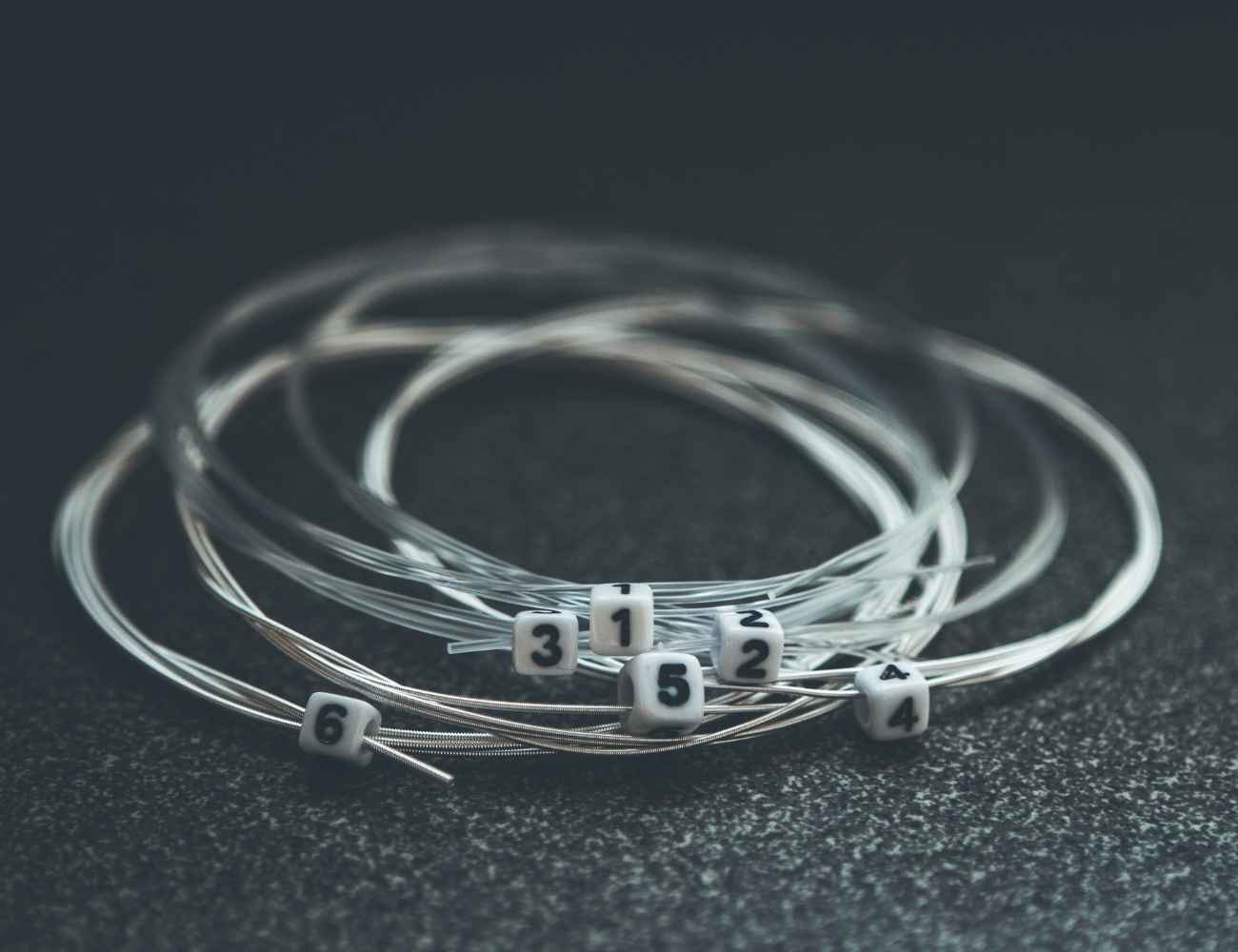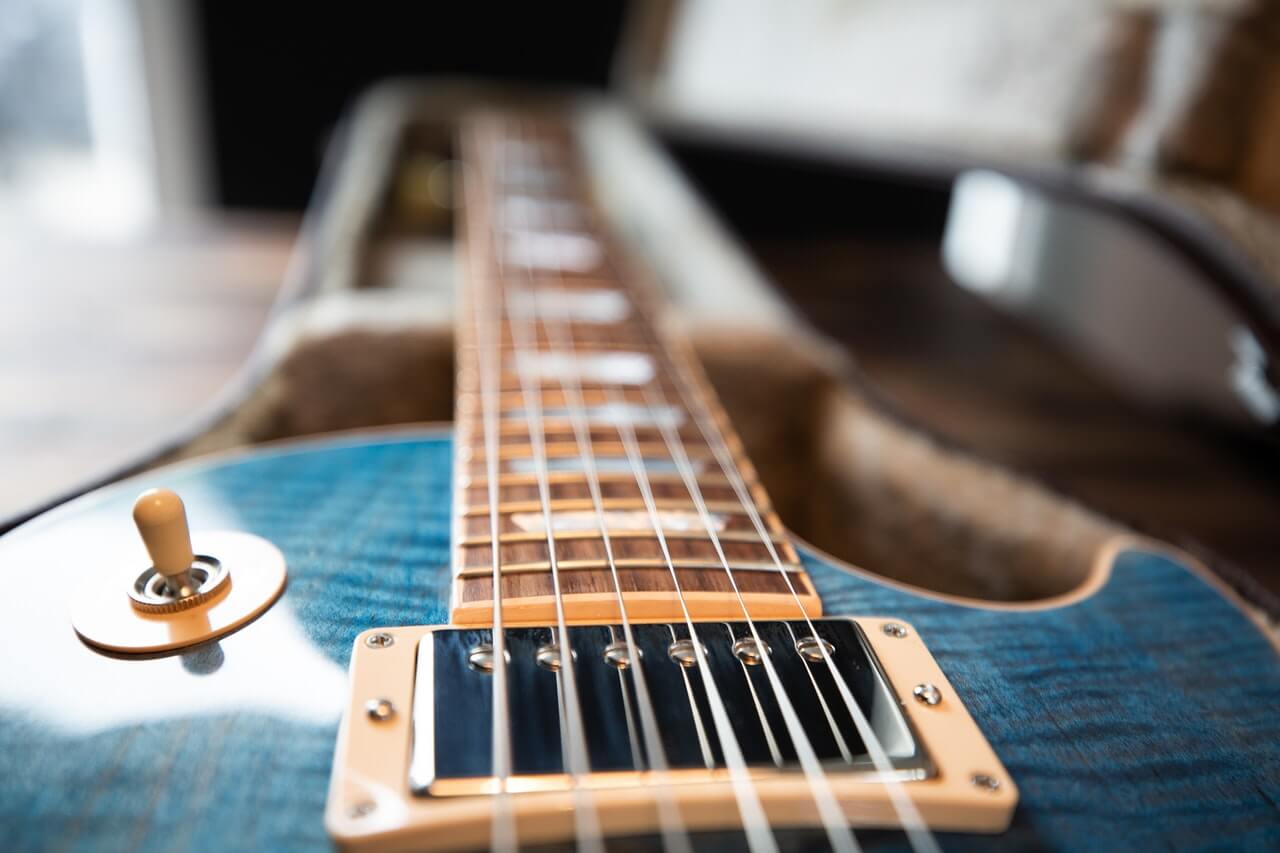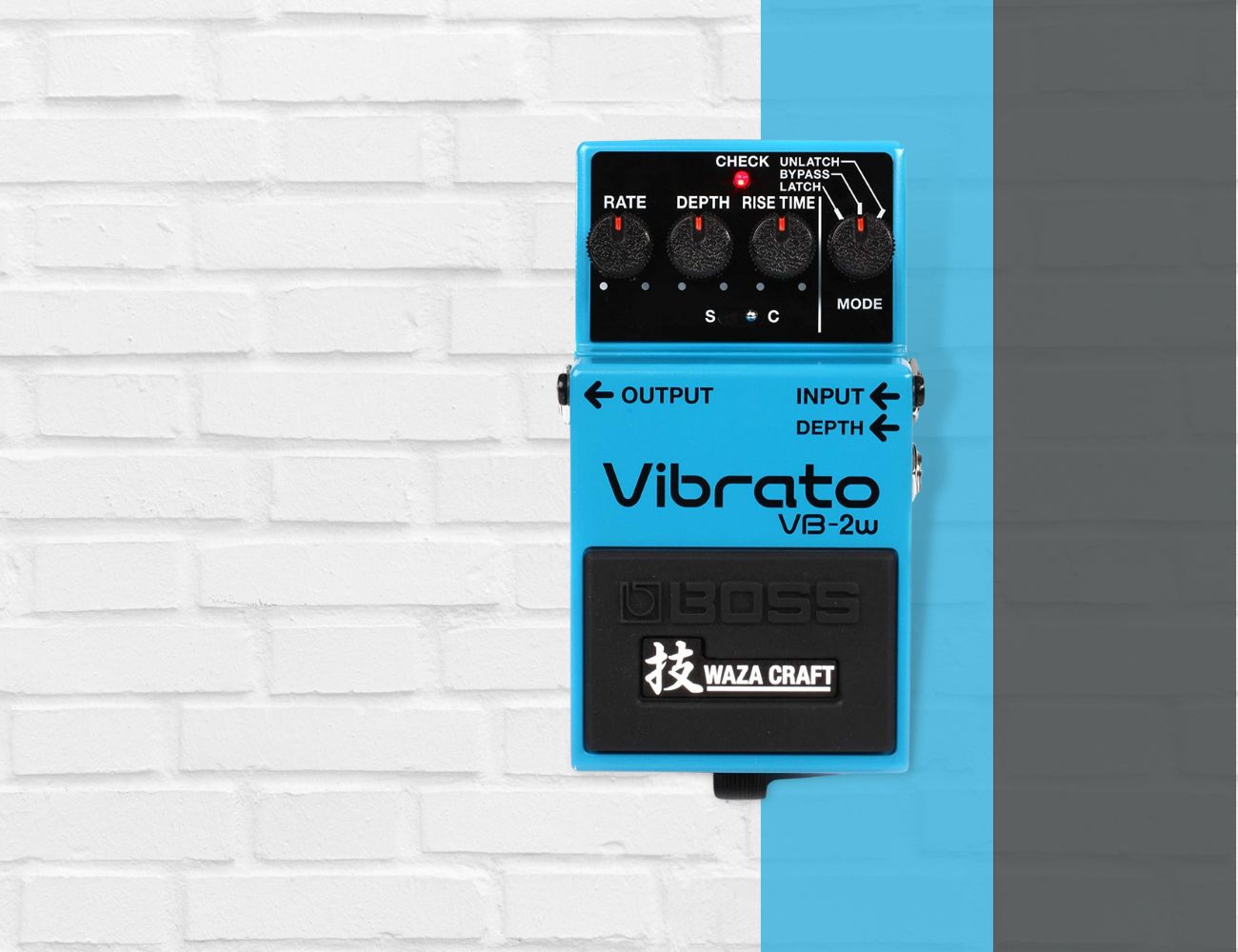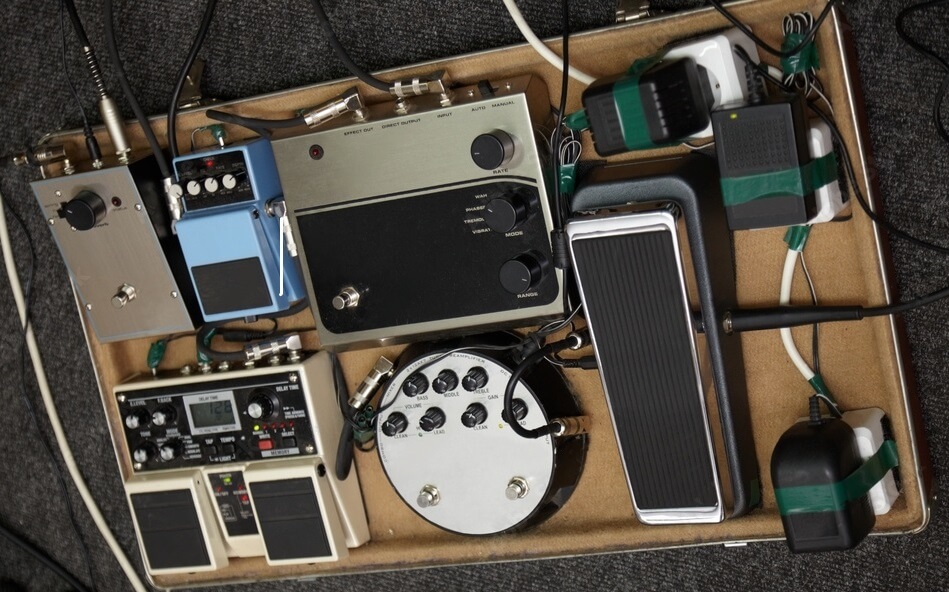Do you ever feel like your guitar tone lacks punch and aggression when playing your favorite metal riffs?
The best guitar strings for metal can truly make or break your sound, and with so many options available, it can be overwhelming to find the perfect set.
In this article, we’ll dive into the world of guitar strings, specifically focusing on the needs of metal guitarists.
We’ll discuss the factors contributing to a string’s performance, such as material and gauge, and provide you with a list of our top picks for heavy-hitting strings.
By the end of this guide, you’ll be well-equipped to make an informed decision and elevate your metal playing to new heights.
Table of Contents
- Best Guitar Strings For Metal
- Ernie Ball Skinny Top Heavy Bottom Guitar Strings
- Elixir Strings 19102 Coated Nickel Electric Guitar Strings
- JIM DUNLOP DHCN1048 Heavy Core Guitar Strings
- Ernie Ball 7-String Skinny Top Heavy Bottom Strings
- DR Strings Electric Guitar Strings 10-52
- GHS Boomer TNT Electric Guitar Strings
- DR Strings Electric Guitar Strings 10-46
- Elixir Strings 19077 Electric Guitar With Optiweb Coating
- Ernie Ball Skinny Top Heavy Bottom Electric Guitar Strings
- DUNLOP DEN1356 Nickel Wound Electric Guitar Strings
- Ernie Ball Skinny Top Heavy Bottom Slinky Electric Guitar Strings
- D’Addario NYXL1260 Electric Guitar Strings Extra Heavy
- Dunlop Heavy Core Heaviest Electric Guitar Strings
- Ernie Ball 6-String Baritone Slinky Nickel Wound Strings
- D’Addario NYXL Electric Guitar Strings
- Ernie Ball Not Even Slinky Nickel Wound Guitar Strings
- DR Strings DDT Guitar Strings 12-60 Extra Extra Heavy
- What to consider before buying guitar strings for metal?
- Are thicker gauge guitar strings better for metal?
- What type of guitar string material is best for metal music?
- Which are the most popular guitar string brands?
- What’s the difference between coated and uncoated strings?
- What’s the average lifespan of guitar strings?
- Do light guitar strings break more easily?
- Should you change all guitar strings or just the broken/bad ones?
Best Guitar Strings For Metal
Before I begin, here are my top selected choices:
Ernie Ball Skinny Top Heavy Bottom Guitar Strings

Ernie Ball Slinkys: Legendary sound, superior quality, and versatile options. Check Price
|
|
JIM DUNLOP DHCN1048 Heavy Core Guitar Strings

Dunlop strings for heavy tunings and quick attack. Check Price
|
Ernie Ball Skinny Top Heavy Bottom Guitar Strings
Legendary sound, superior quality, and versatile options.
Ernie Ball Slinky strings deliver iconic tone and balanced performance for all types of guitarists. Nickel-plated steel wrapped around a hex-shaped tin-plated high-carbon steel core wire offers a bright, durable sound that stands the test of time.
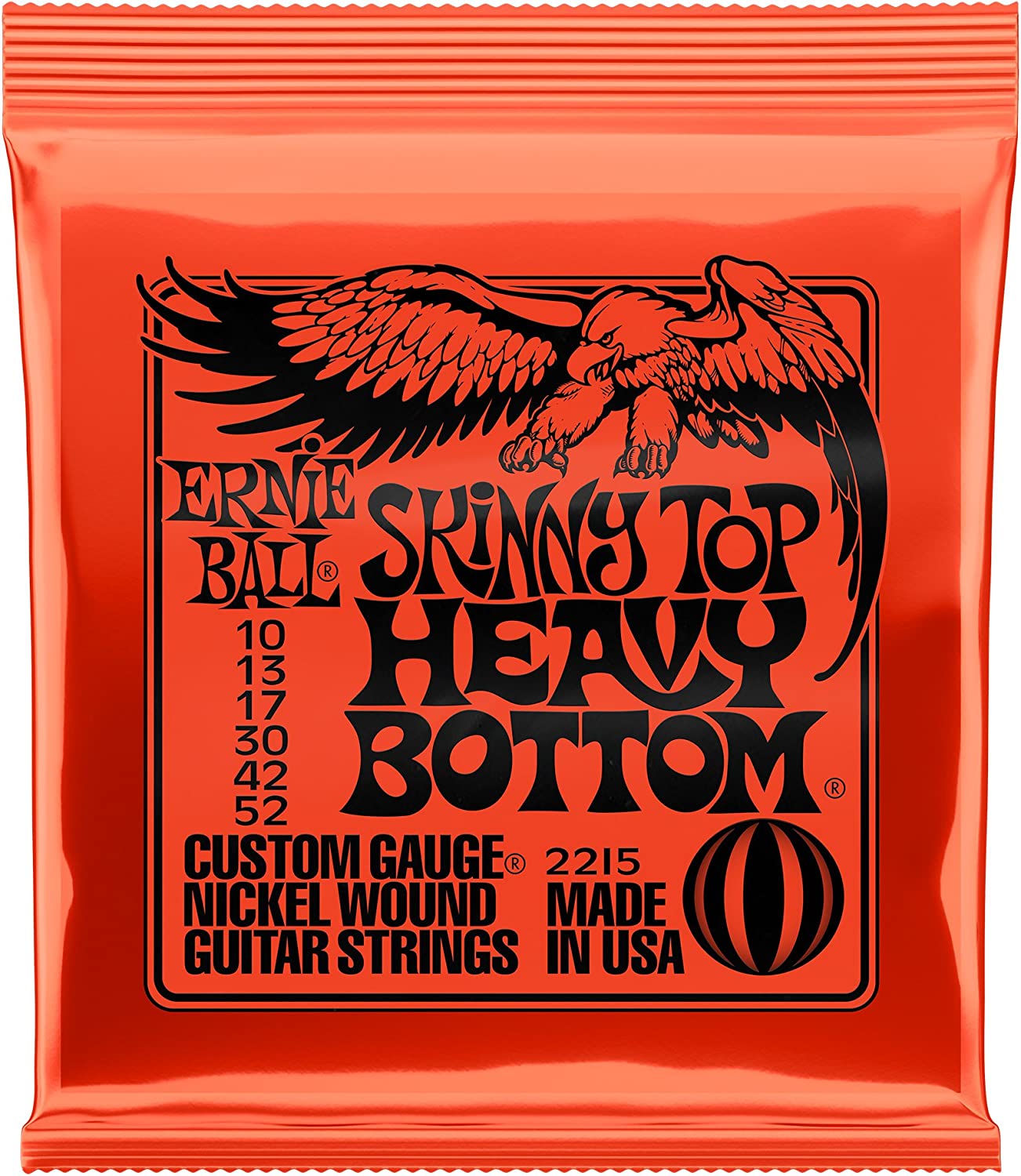
Ernie Ball Skinny Top Heavy Bottom Slinky Nickel Wound Electric Guitar Strings are designed with a unique 10-52 gauge combination, offering guitarists a balanced playing experience.
In addition, these strings feature a thinner top section for easier solos and a heavier bottom section for richer chords and rhythm playing.
Made in California, USA, these guitar strings use high-quality nickel-plated steel wire wrapped around a hex-shaped steel core wire, resulting in a bright, well-balanced tone that suits various playing styles.
In addition, the plain strings are crafted from specially tempered tin-plated high-carbon steel, enhancing tonal quality.
Ernie Ball’s Element Shield Packaging helps prolong the strings’ lifespan by keeping them fresh and protected.
As a result, these strings are favored by many legendary musicians worldwide, including Slash, Jimmy Page, Metallica, and Eric Clapton.
With their versatile gauge combination and superior materials, the Ernie Ball Skinny Top Heavy Bottom Slinky strings are ideal for guitarists seeking an optimal balance of performance and durability.
- My Review
I can attest to their impressive performance and sound quality as a guitarist who’s tried the Ernie Ball Skinny Top Heavy Bottom Slinky Nickel Wound Electric Guitar Strings.
With a unique 10-52 gauge combination, these strings provide a balanced playing experience, offering ease in solos and rich chords for rhythm playing.
I found the strings to have a bright and well-balanced tone, suitable for various playing styles.
The nickel-plated steel wire wrapped around a hex-shaped steel core wire contributes to this tonal quality, while the plain strings, made from specially tempered tin-plated high-carbon steel, further enhance the sound.
One notable feature of these strings is the Element Shield Packaging, which helps to prolong their lifespan by keeping them fresh and protected.
This aspect is particularly important for guitarists who want to maintain their strings’ performance over time.
Although many legendary musicians love the strings, there are some potential downsides.
For instance, I noticed that the strings might require frequent retuning, especially if you’re doing a lot of bends.
Additionally, while the quality is generally good, there might be occasional strings breaking or rusting issues.
Finally, you must purchase from a reputable source to avoid counterfeit products.
Despite these minor concerns, my experience with the Ernie Ball Skinny Top Heavy Bottom Slinky strings has been largely positive.
Here are the ratings I’ll give to the Ernie Ball Skinny Top Heavy Bottom Slinky Electric Guitar Strings:
Their versatility, durability, and superior materials make them an excellent choice for guitarists seeking an optimal balance between performance and longevity.
While they may not be perfect for every player, they certainly live up to the reputation of the Ernie Ball brand and are worth trying out for those seeking a unique and balanced string set.
- Pros:
- Unique 10-52 gauge combination.
- Bright, well-balanced tone.
- Element Shield Packaging.
- Cons:
- May require frequent retuning.
- Potential string breakage or rust.
- Counterfeit products risk.
My final verdict is that the Ernie Ball Skinny Top Heavy Bottom Slinky Nickel Wound Electric Guitar Strings are a solid choice for guitarists seeking a unique gauge combination, bright tone, and reputable brand.
While there are some concerns regarding durability and the need for frequent retuning, the overall performance and quality make these strings worth considering.
Elixir Strings 19102 Coated Nickel Electric Guitar Strings
Long-lasting, corrosion-resistant tone with reliable performance.
Elixir Strings provide long-lasting, great-sounding tone with corrosion resistance and tuning stability, making them reliable for any environment.
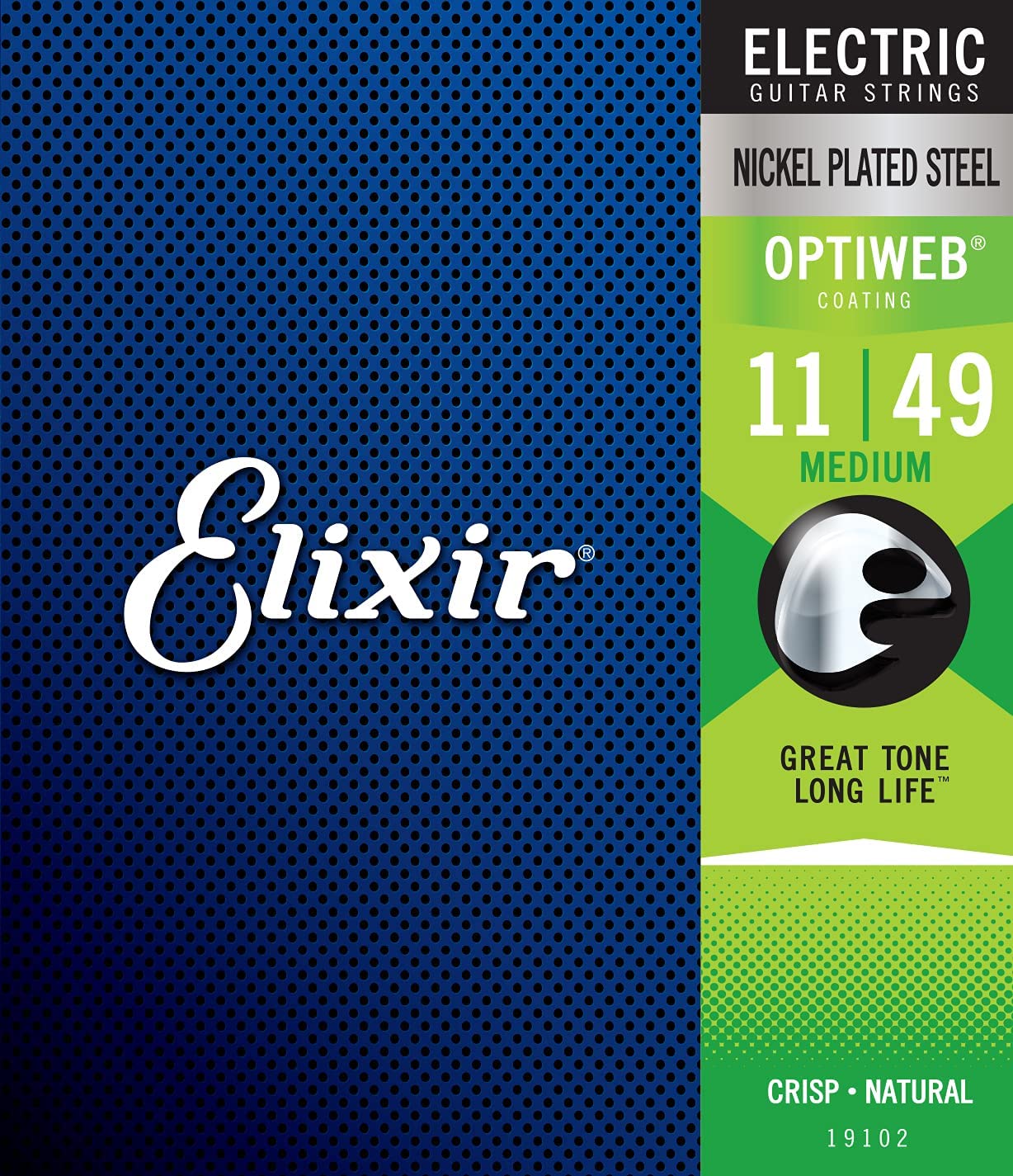
These strings are designed for electric guitars and feature a medium gauge with a gold color.
In addition, they are made from coated nickel and boast various features, such as corrosion resistance, greater tuning stability, and reliable performance.
The product has received mixed reviews from customers.
Some positive aspects mentioned include their long-lasting tone, ease on the fingers, and affordability.
However, some negative points have been raised, such as the coating interfering with the brightness, string breakage during tuning, and poor packaging.
Ultimately, it seems that the Elixir Strings 19102 Coated Nickel Electric Guitar Strings may be a good fit for some players, while others may prefer a different brand or type of string.
- My Review
As a guitarist, I recently tried the Elixir Strings 19102 Coated Nickel Electric Guitar Strings in a medium gauge with a gold finish.
Right off the bat, I was impressed by their durability and long-lasting tone.
In addition, the nickel-plated steel wrap wire construction provided a crisp and clean sound, while the Optiweb coating gave a natural playing feel.
One of the most notable features of these strings was their corrosion resistance.
They held up well against debris buildup and rust, extending their lifespan and making them a more cost-effective choice.
Additionally, their tuning stability was excellent, ensuring consistent performance even when faced with fluctuating temperatures and humidity levels.
However, I did notice a few drawbacks during my time with these strings.
First, while the Optiweb coating offers a natural feel, it seems to slightly affect the overall brightness of the sound.
This may not be an issue for some players, but those looking for a brighter tone might find it lacking.
Another issue I encountered was the packaging.
While this may not be a deal-breaker for most, the packaging appeared to have water damage marks, and the seal was broken.
This raised concerns about the product’s authenticity, but after inspecting the individual string bags, I found that they had the brand name on them, which reassured me.
Despite these minor issues, I found the Elixir Strings 19102 Coated Nickel Electric Guitar Strings a solid choice for electric guitar players.
Here are the ratings I’ll give to the Elixir Strings 19102 Coated Nickel Electric Guitar Strings:
Their long-lasting tone, corrosion resistance, and tuning stability make them a worthwhile investment, even with the potential drawbacks of the coating affecting brightness and packaging concerns.
I’d recommend trying these strings, especially for those who prioritize durability and consistent performance in their guitar strings.
- Pros:
- Long-lasting tone and durability.
- Corrosion-resistant coating.
- Greater tuning stability.
- Cons:
- Some users report string breakage.
- Coating may affect brightness.
- Potential packaging issues.
My final verdict is that the Elixir Strings 19102 Coated Nickel Electric Guitar Strings offer a good balance of durability, material quality, and performance.
While there may be some concerns regarding the brightness of the tone and the packaging, the overall positive aspects of these strings, such as their corrosion resistance and tuning stability, make them a worthwhile investment for electric guitar players.
JIM DUNLOP DHCN1048 Heavy Core Guitar Strings
Dunlop strings for heavy tunings and quick attack.
Dunlop Manufacturing creates world-class gear for musicians, including picks, pedals, and accessories. Renowned by legendary and current day superstars, Dunlop’s products set industry standards with innovative strings and vintage pedals.
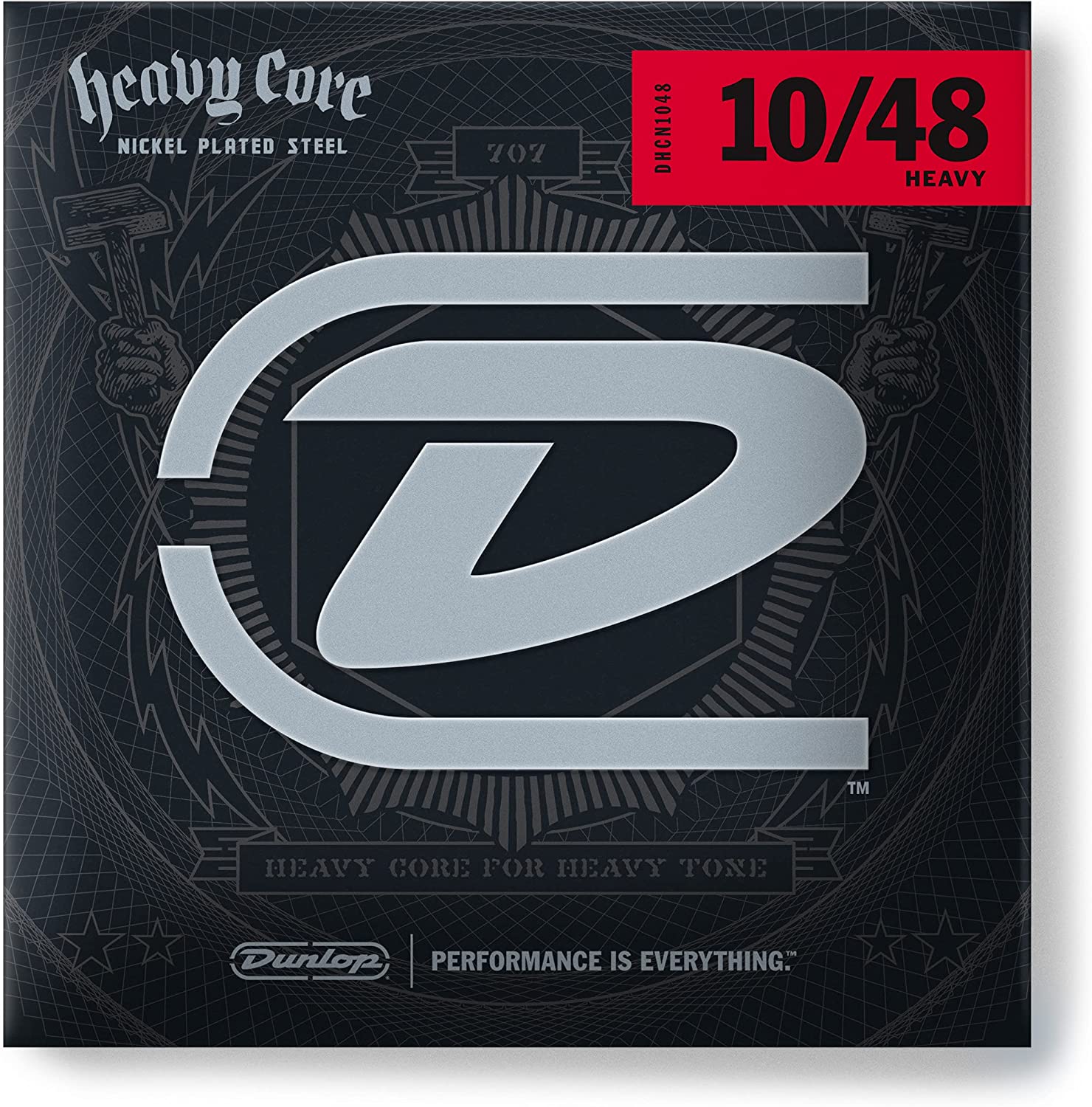
The JIM DUNLOP DHCN1048 Heavy Core Guitar Strings are designed for dropped and lowered tunings and are suitable for electric guitars.
They have a quick attack and a defined low end.
The package contains six strings with a gauge of .010–.048 and is made of nickel steel.
The product has received mixed reviews, with some users praising its performance in lower tunings, durability, and tone.
Positive aspects include good tension, comfortable play, and suitability for various music genres.
Some users also appreciated the price and ease of installation.
On the other hand, negative reviews mentioned issues with the strings not staying in tune, breaking during installation, and having a short lifespan.
In addition, some users found the strings sticky, rubbery, or flat-toned and preferred brands such as Ernie Ball, D’Addario, or Elixir.
- My Review
After trying the JIM DUNLOP DHCN1048 Heavy Core Guitar Strings on my electric guitar, I found that these strings are designed for dropped and lowered tunings, providing a quick attack and a defined low end.
In addition, they come in a pack of 6 strings with a gauge of .010–.048 and are made of nickel steel material, contributing to their durability and overall performance.
I appreciated these strings’ tension, making them comfortable to play and suitable for various music genres.
Additionally, they were easy to install and seemed to hold up well over time.
They were particularly useful for playing styles such as metal, rock, and blues, where a heavier gauge is often preferred.
However, a few aspects of these strings could use improvement.
For instance, they occasionally struggled to stay in tune, especially after a few weeks of usage.
Furthermore, I experienced some issues with the strings breaking during installation, which was disappointing considering the quality I expected from a brand like JIM DUNLOP.
Another drawback was the strings’ somewhat sticky or rubbery feeling, which might not be suitable for everyone’s playing style.
Additionally, while the tone was generally good, it could be flat or lifeless, particularly compared to other brands like Ernie Ball, D’Addario, or Elixir.
Here are the ratings I’ll give to the JIM DUNLOP DHCN1048 Heavy Core Guitar Strings:
Despite these criticisms, the JIM DUNLOP DHCN1048 Heavy Core Guitar Strings offer a decent option for those experimenting with lowered tunings and a heavier gauge.
While they may not be perfect for everyone, they certainly have their merits and are worth considering for those who value durability and a defined low end in their guitar strings.
- Pros:
- Designed for dropped tunings
- Comfortable play and tension
- Easy installation
- Cons:
- Tuning stability issues
- Occasional string breakage
- Sticky or rubbery feel
My final verdict is that the JIM DUNLOP DHCN1048 Heavy Core Guitar Strings are a decent option for those looking to explore dropped tunings and heavier gauges.
While they may have some drawbacks regarding tuning stability and string feel, they provide comfortable play, tension, and easy installation.
Ernie Ball 7-String Skinny Top Heavy Bottom Strings
Ernie Ball’s Cobalt Slinky 7-String Strings for superior output, clarity, and magnetic relationship.
Ernie Ball Cobalt Slinky strings offer extended dynamic range, incredible harmonic response, increased low end, and crisp, clear highs for guitarists and bassists. These strings are precision wound with a patented iron-cobalt alloy wire for improved output and clarity.
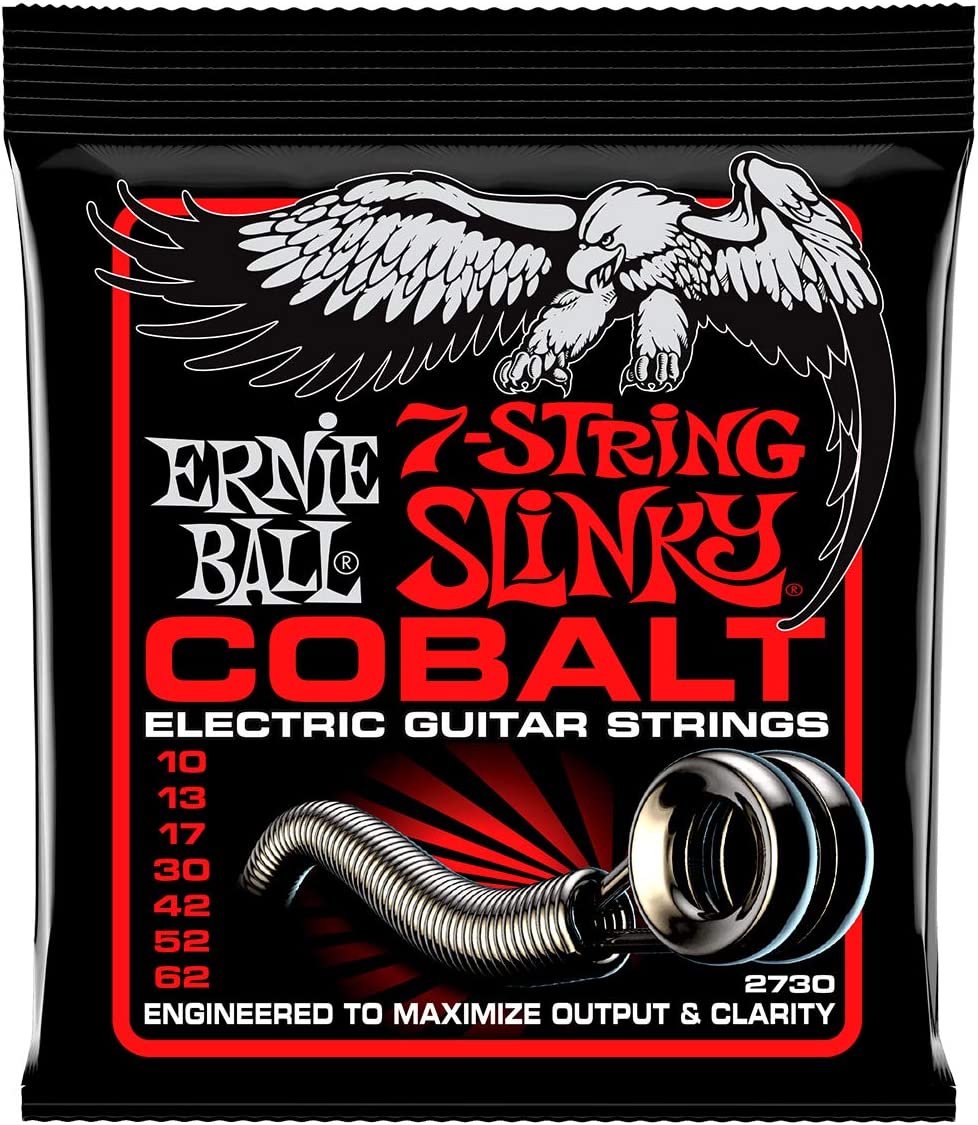
Ernie Ball’s 7-String Skinny Top Heavy Bottom Electric Guitar Strings offer a unique combination of string gauges that cater to guitarists’ needs on seven-string guitars.
These strings provide an excellent balance of playability and tone, making them a popular choice among musicians requiring a versatile and reliable string set.
The Skinny Top Heavy Bottom design features thinner strings for the higher notes, allowing for easier bending and greater flexibility. The thicker strings on the lower end provide a robust and powerful sound.
This combination ensures you can achieve a wide range of tones, from bright and crisp to warm and full-bodied.
Constructed using high-quality materials, these Ernie Ball strings boast a nickel-plated steel wrap wire around a tin-plated hex core.
This construction enhances durability and promotes a long-lasting, bright sound with excellent intonation.
Furthermore, the strings are designed to resist corrosion, ensuring performance even with prolonged use.
In a nutshell, Ernie Ball 7-String Skinny Top Heavy Bottom Electric Guitar Strings provide an optimal balance of playability, tone, and durability, making them an excellent choice for seven-string guitar players who demand versatility and reliability from their strings.
- My Review
After trying out the Ernie Ball 7-String Skinny Top Heavy Bottom Electric Guitar Strings on my seven-string guitar, I must say that I am quite impressed with the performance and quality of these strings.
In addition, the unique combination of gauges delivers a fantastic balance of playability and tone, making it easy to transition between different styles of music while maintaining a consistent and satisfying sound.
One of the first things I noticed was the increased flexibility in the higher strings, which allowed me to perform bends and vibratos with less effort, resulting in a more expressive playing experience.
On the other hand, the thicker lower strings provided a full-bodied and powerful sound that suited heavier styles such as metal and progressive rock.
In terms of durability, the nickel-plated steel wrap wire and tin-plated hex core construction held up well during extended playing sessions, which is essential for any serious musician.
I also appreciated the corrosion resistance, which helped maintain the strings’ performance and brightness.
While using these strings, I discovered they provided excellent intonation and tuning stability, which is crucial for a seamless playing experience.
In addition, the strings settled in relatively quickly after installation, and I didn’t have to retune my guitar as frequently as with some other strings I’ve tried.
However, one minor drawback I encountered was that the increased thickness of the lower strings might make it challenging for beginners or players with smaller hands to navigate the fretboard comfortably.
This issue could be overcome with practice and proper technique, but it’s something to consider before purchasing these strings.
Here are the ratings I’ll give to the Ernie Ball 7-String Skinny Top Heavy Bottom Electric Guitar Strings:
Despite this minor issue, I found the Ernie Ball 7-String Skinny Top Heavy Bottom Electric Guitar Strings a reliable and high-performing choice for seven-string guitar players.
The unique gauge combination, durability, and overall sound quality make these strings a solid investment for any serious musician looking to get the most out of their instrument.
- Pros:
- Unique gauge combination.
- Excellent playability and tone.
- High durability and corrosion resistance.
- Cons:
- Thicker strings challenging for beginners.
- Potential discomfort for smaller hands.
My final verdict is that the Ernie Ball 7-String Skinny Top Heavy Bottom Electric Guitar Strings are an excellent choice for seven-string guitar players seeking a unique gauge combination, impressive playability, and high-quality tone.
These strings are a reliable investment for any serious musician with their durability, corrosion resistance, and good intonation.
DR Strings Electric Guitar Strings 10-52
Dimebag Darrell’s signature, treated nickel-plated strings for heavy riffing.
Dimebag Darrell’s signature HI-VOLTAGE electric guitar strings feature a hexagonal core wire and nickel-plated steel wrap wire for extended life and rich tone. Coated with STRINGLIFE liquid polymer for protection, these strings are perfect for metal players.
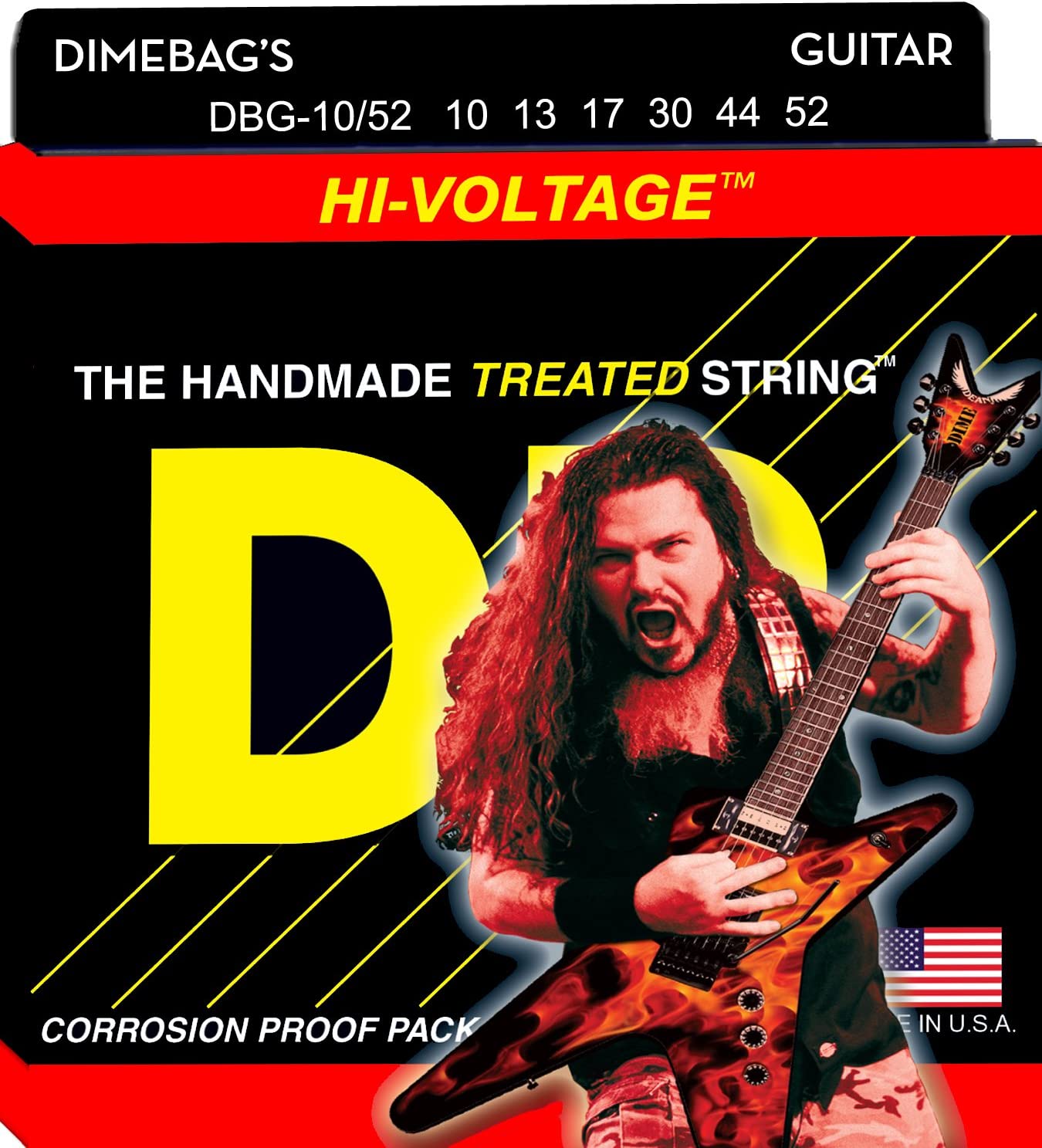
The DR Strings Electric Guitar Strings, Dimebag Darrell Signature, are a set of treated nickel-plated strings specifically crafted for electric guitars.
These medium gauge strings, ranging from 10-52, are designed to cater to the needs of heavy metal guitarists.
The late metal icon, Dimebag Darrell, endorsed the strings, known for their high-voltage output.
These strings feature a hexagonal core wire and a nickel-plated steel wrap wire, which is treated with a special molecular bonding liquid polymer called String Life.
This treatment protects the strings from corrosive elements, ensuring longevity and consistent performance.
As Dimebag Darrell would say, these strings are perfect for various play styles, including intense string bends, whammy bar dives, harmonic screams, and heavy riffing.
The product offers a balanced tone with a good mix of brightness and warmth.
They are suitable for various electric guitar models and can be used by guitarists with different playing styles.
Made in the USA, these strings are known for their durability and responsiveness, providing players with a reliable and enjoyable playing experience.
- My Review
As a guitarist who has experience using the DR Strings Electric Guitar Strings, Dimebag Darrell Signature, I must say that these treated nickel-plated strings deliver a powerful and versatile performance.
The medium gauge, ranging from 10-52, caters perfectly to heavy metal guitarists, though they are also suitable for various playing styles.
When I first installed these strings on my electric guitar, I noticed the unique feel of the treated wrap wire.
It didn’t have some coated strings’ thick, slippery texture, which was a pleasant surprise.
Instead, the hexagonal core and nickel-plated steel wrap wire, treated with String Life, made the strings feel durable and corrosion-resistant.
Upon playing, I was impressed by the high-voltage output and balanced tone these strings provided.
They were bright and warm without being overly dominant in the low or high end.
In addition, the strings were responsive, allowing me to easily produce blood-curdling harmonic screams, heavy riffing, and big string bends.
I particularly enjoyed their tuning stability, even when using the whammy bar extensively.
The strings held up well during intense playing sessions, maintaining their tonal quality for a considerable time.
However, after some days, I did notice a slight drop in brightness, which is common among most strings.
While the price point may be a bit high for some players, I believe that the quality and performance of these strings justify the investment.
Here are the ratings I’ll give to the DR Strings Electric Guitar Strings:
They offer a unique playing experience, endorsed by the late metal icon Dimebag Darrell, which should not be overlooked.
In my experience, the DR Strings Electric Guitar Strings, Dimebag Darrell Signature, are a reliable and enjoyable choice for guitarists looking to achieve powerful, high-voltage tones across various play styles.
- Pros:
- High-voltage output.
- Responsive and versatile.
- Corrosion-resistant treatment.
- Cons:
- Slight brightness drop over time.
- Higher price point.
- Not suitable for all guitarists.
My final verdict is that the DR Strings Electric Guitar Strings, Dimebag Darrell Signature, are a high-quality and versatile choice for guitarists looking for powerful tones and a durable, corrosion-resistant product.
Their unique treatment, responsiveness, and balanced sound make them a great option for various playing styles, especially heavy metal.
GHS Boomer TNT Electric Guitar Strings
Three sets of GHS Boomer TNT 10-52 electric guitar strings, nickel-plated steel and coated for superior sound.
This prewired pickup set provides a hassle-free upgrade for Telecaster-style guitars, delivering a bright, responsive, and virtually noiseless tone. Quick and easy installation with solderless connectors and pre-wired volume and tone controls.
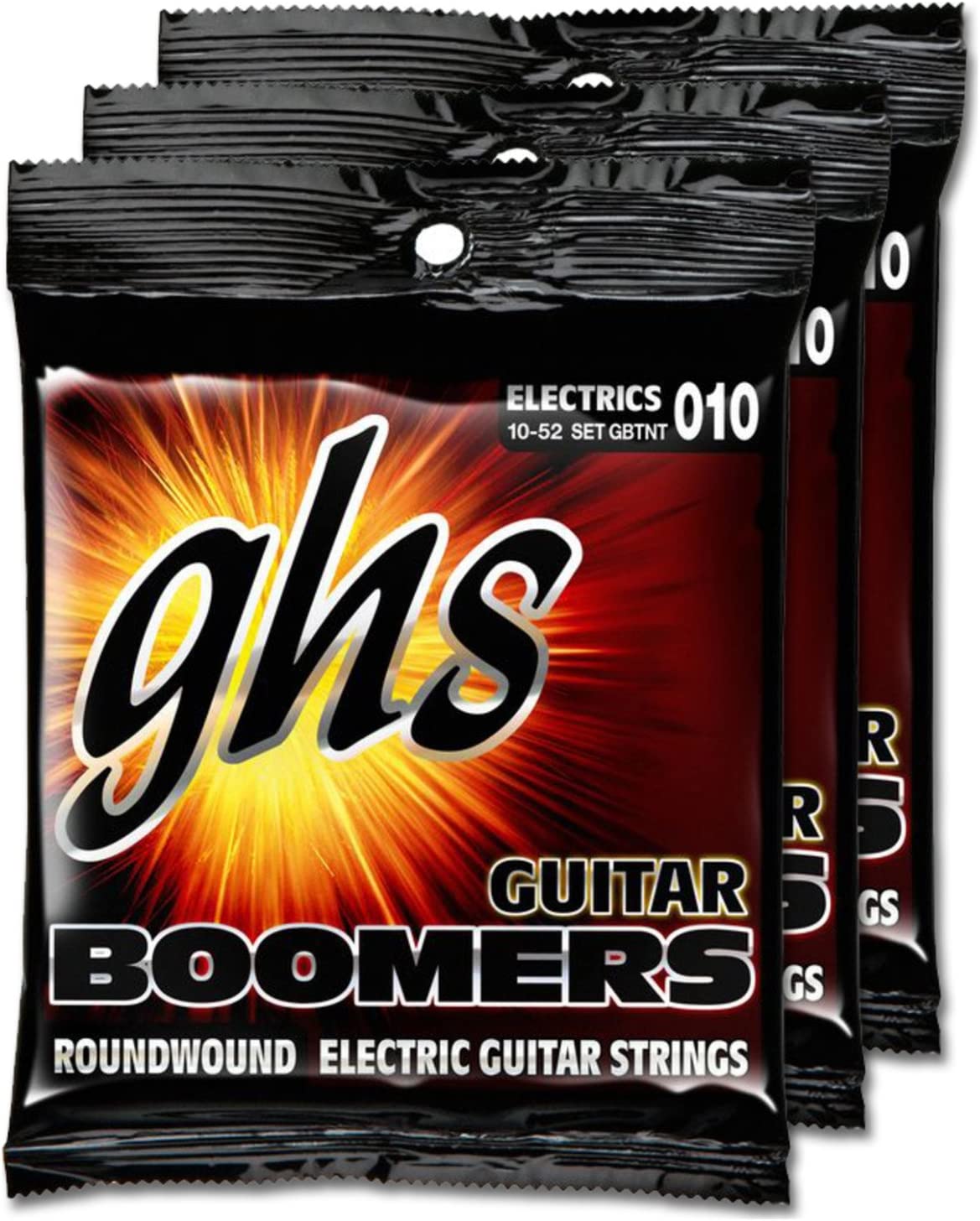
The GHS Boomer TNT 10-52 Electric Guitar Strings (GBTNT) is a set of three high-quality, nickel-plated steel strings designed for electric guitars.
These strings are manufactured by GHS, a well-regarded brand in the music industry, and are known for their durability and bright sound, making them a go-to choice for many musicians.
These guitar strings come in a gauge of .01 and are specifically designed for electric guitars.
The nickel-plated steel material used in their construction provides reliable performance and ensures a long-lasting product.
Additionally, these strings have a coated finish, which gives them an extra layer of protection against wear and tear.
- My Review
As a guitarist who has tried the GHS Boomer TNT 10-52 Electric Guitar Strings (GBTNT), they are an excellent choice for my electric guitar needs.
I first noticed their bright and clear tone, which made my guitar sound lively and full.
In addition, the nickel-plated steel material used in their construction provides a great balance of durability and playability, ensuring that these strings last long without losing their tonal qualities.
When I first strung up my guitar with these strings, I was impressed by their smooth and comfortable feel.
The coated finish on the strings contributes to their longevity, as it helps protect them from the usual wear and tear that comes with regular playing.
This coating also adds a nice slickness to the strings, making bends and slides much easier to execute.
Playing various styles of music on my guitar, I found that the GHS Boomer TNT 10-52 strings shine in genres that require a powerful and bright sound, such as rock and metal.
However, they also performed well in more mellow genres like jazz and blues, providing a versatile and well-rounded tonal palette.
One minor issue I encountered was that the strings took a little time to settle in and hold their tuning.
However, after a brief break-in period, they stayed in tune remarkably well, and I didn’t have to worry about constantly retuning my guitar.
These strings are worth the investment in terms of value for money.
Here are the ratings I’ll give to the GHS Boomer TNT Electric Guitar Strings:
The fact that they come in a set of three makes them even more appealing, as it ensures that I have backup strings ready to go in case I need to replace any during a gig or practice session.
To summarize my experience with the GHS Boomer TNT 10-52 Electric Guitar Strings, I highly recommend them to any guitarist seeking a high-quality, long-lasting, versatile set of electric guitar strings.
- Pros:
- Bright and clear tone.
- Durable nickel-plated steel material.
- Smooth, comfortable feel.
- Cons:
- Initial tuning stability issues.
- Settling-in period required.
- Limited cons reported.
My final verdict is that the GHS Boomer TNT 10-52 Electric Guitar Strings are high-quality, durable, and versatile strings that deliver excellent tone and performance for various music genres.
The bright and clear sound, comfortable feel, and exceptional sustain make these strings a fantastic choice for both professional and amateur guitarists.
In addition, the nickel-plated steel material and coated finish ensure longevity, while their adaptability to different playing styles adds to their overall appeal.
In conclusion, these strings are a worthy investment for any electric guitar player seeking top-notch performance and reliability.
DR Strings Electric Guitar Strings 10-46
Hand-crafted, nickel-plated strings for electric guitar with long-lasting performance.
DR Strings manufactures handcrafted round core guitar strings for superior tone and clarity. Made in the USA with a unique blend of metals, these strings are designed for maximum playability, durability, and power.
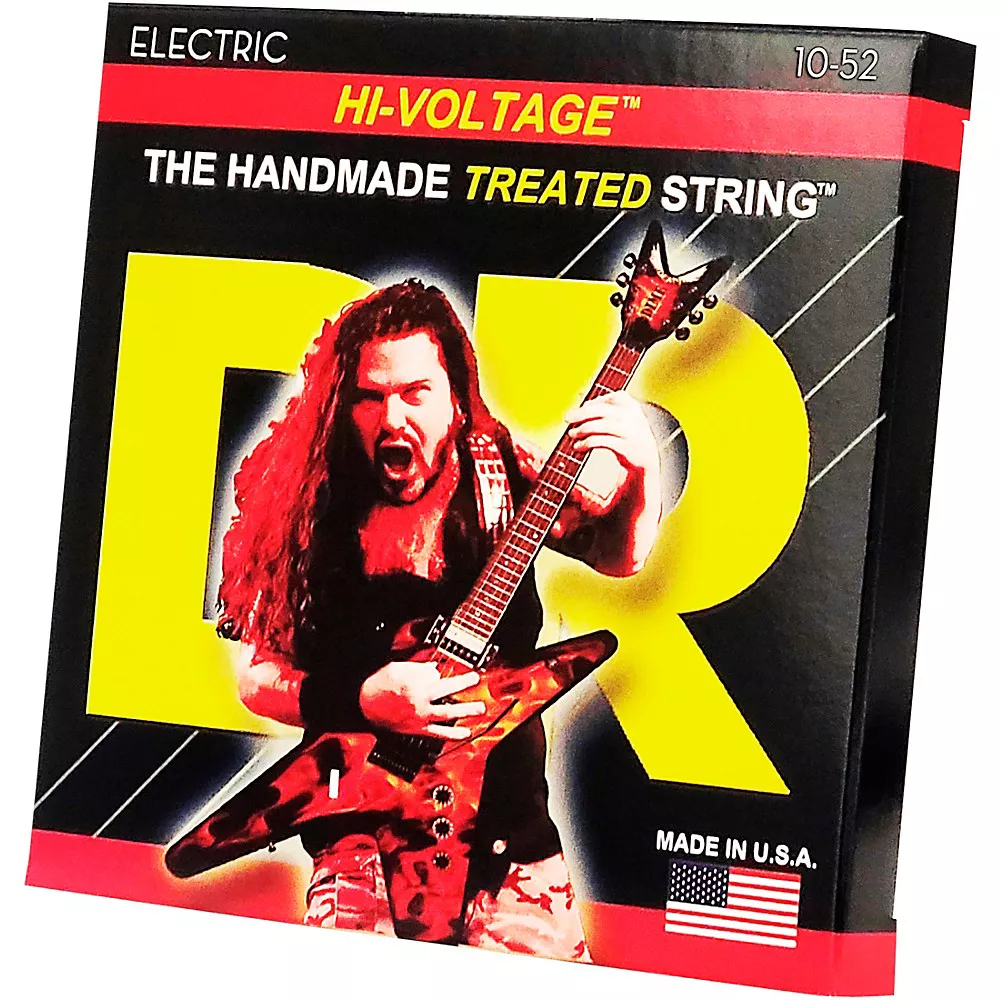
We already featured this brand above, but I feel like it deserves another spot on the list, since these two gauge options both offer a great playability for metal.
The DR Strings Electric Guitar Strings, Dimebag Darrell Signature, are designed to cater to the needs of guitarists who indulge in various playing styles.
These medium gauge strings are nickel-plated and treated with string life, ensuring they remain fresh and bright for an extended period.
As a result, they suit everything from string bends and heavy chunky riffs to whammy bar dives and harmonic screams.
These strings belong to the DR Strings brand and are specifically crafted for electric guitars.
Made from nickel, they have a metal finish, offering a distinctive look and feel.
In addition, the strings’ core is hexagonal, contributing to their durability and performance.
As a product of DR Strings, these guitar strings result from the company’s expertise in hand-making round core strings since 1989.
The meticulous craftsmanship of these strings ensures that they deliver an exceptional playing experience, maintaining their tuning stability and minimizing fret buzzing.
- My Review
After trying the DR Strings Electric Guitar Strings and Dimebag Darrell Signature, I must say that they have several impressive qualities.
First and foremost, the medium gauge and nickel-plated construction provide a durable, long-lasting playing experience.
These strings are designed to accommodate various playing styles, making them suitable for diverse musical genres.
When I played these strings, I noticed their remarkable tuning stability.
They stayed in tune even after extended sessions of string bending and whammy bar dives.
The hexagonal core and metal finish added to the strings’ durability and gave them a distinctive look and feel, which I appreciated.
One of the things that stood out the most for me was the “sponginess” of the strings when tuned down a half step to Eb. This characteristic allowed for enough string tension without compromising the instrument’s setup, resulting in a comfortable and enjoyable playing experience.
Moreover, the strings managed to minimize fret buzzing, which is always a significant concern for guitarists.
However, there were a few downsides that I encountered.
Here are the ratings I’ll give to the DR Strings Electric Guitar Strings:
For instance, I found the strings to sound thin compared to brands like GHS Boomers.
Additionally, the strings’ brightness faded quickly after a few hours of playing, which was somewhat disappointing.
- Pros:
- Durable, nickel-plated construction.
- Accommodates diverse playing styles.
- Excellent tuning stability.
- Cons:
- Thin sound compared to other brands.
- Brightness fades quickly.
- Some strings may break easily.
My final verdict is that the DR Strings Electric Guitar Strings, Dimebag Darrell Signature, offer a durable and versatile playing experience that caters to multiple music genres.
Although they have some drawbacks, such as a thinner sound compared to other brands and a quick fade in brightness, their excellent tuning stability, sustain, and intonation make them a solid choice for guitarists who value these qualities in their strings.
Elixir Strings 19077 Electric Guitar With Optiweb Coating
Premium electric guitar strings with Optiweb coating for long-lasting great tone.
Elixir Strings’ Nickel Plated Steel with OPTIWEB Coating deliver the same natural tone and feel of uncoated strings with long-lasting tone life and corrosion resistance for reliable performance.
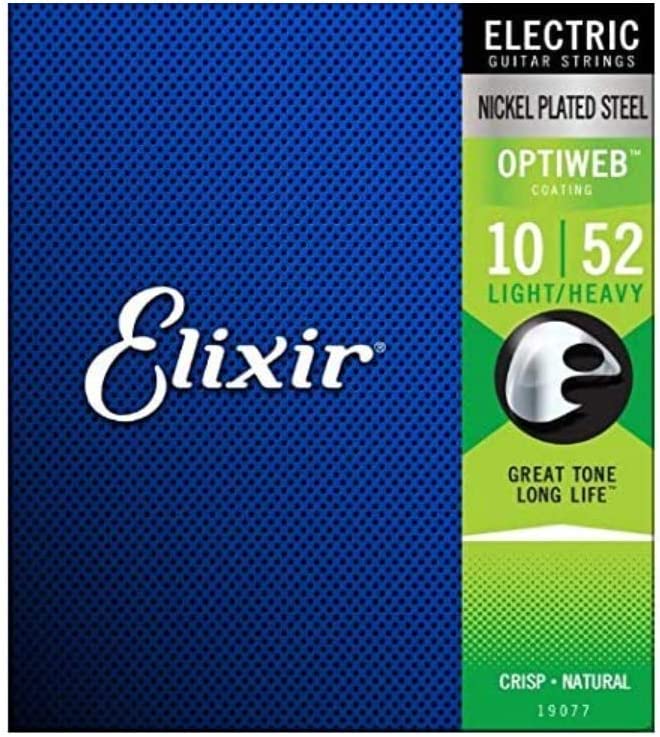
The Elixir Strings 19077 is a set of electric guitar strings designed with a unique Optiweb Coating, which offers a natural feel and contributes to a crisp and clear tone.
These strings are made with nickel-plated steel wrap wire, providing a durable and long-lasting option for guitarists.
In addition, the coating technology used by Elixir not only protects against common corrosion and debris buildup but also helps to extend the tone life of the strings, making them last longer than other coated or uncoated strings on the market.
These light/heavy gauge strings (.010-.052) are suitable for electric guitars, and their multicolor design adds a touch of personality to your instrument.
In addition, the anti-rust plating on plain steel strings ensures a longer tone life for the entire set, making these strings a reliable choice for musicians who want consistent performance in various environments, including fluctuating temperatures and humidity.
Elixir Strings is a well-known brand that offers a wide array of premium string options for different instruments and styles, making this product a popular choice among guitarists who value quality and longevity in their strings.
- My Review
After using the Elixir Strings 19077 Electric Guitar Strings with Optiweb Coating, I must say that they are an excellent choice for my electric guitar.
These light/heavy gauge strings (.010-.052) provided the natural feel and crisp tone I sought while playing.
In addition, the nickel-plated steel wrap wire construction ensured durability and longevity, giving me the confidence that these strings would last long.
One of the standout features of these strings is the Optiweb Coating, which protects against corrosion and debris buildup and extends the overall tone life.
I noticed that these strings outlasted other coated or uncoated strings I’ve tried, making them a cost-effective option in the long run.
The anti-rust plating on the plain steel strings also contributed to the longer tone life for the entire set, which was a significant advantage.
As I played my electric guitar, I appreciated the consistency in performance that these strings offered.
They maintained their tuning stability and handled fluctuations in temperature and humidity well, ensuring that my guitar sounded its best during each play session.
However, I did notice that the coating on the strings began to fray after some time, which affected the smoothness of the strings’ feel.
This is something to consider for those who are particular about the texture of their strings.
Despite this minor issue, I found the overall quality and sound of the Elixir Strings 19077 to be superb.
In my experience, these strings are an excellent option for guitarists who value a crisp tone, natural feel, and extended tone life.
Here are the ratings I’ll give to the Elixir Strings 19077 Electric Guitar With Optiweb Coating:
They may not be the perfect fit for everyone.
Still, their unique features and reliable performance make them a worthy consideration for electric guitar players seeking quality and longevity in their strings.
- Pros:
- Natural feel and crisp tone.
- Long-lasting and durable.
- Anti-rust plating on plain steel strings.
- Cons:
- Coating may fray over time.
- Not suitable for all playing styles.
- Pricey compared to other strings.
My final verdict is that the Elixir Strings 19077 Electric Guitar Strings with Optiweb Coating are a high-quality option for guitarists seeking a durable, long-lasting, and great-sounding set of strings.
With their natural feel, crisp tone, and excellent performance in various environments, these strings provide a reliable and enjoyable playing experience.
Despite some minor issues with the coating fraying over time, the overall benefits of these strings make them a worthwhile investment for electric guitar players.
Ernie Ball Skinny Top Heavy Bottom Electric Guitar Strings
Offers enhanced shredability, durability, and superior tuning stability.
Ernie Ball’s Coated Slinky guitar strings provide vivid tone and lasting durability with a patented reinforcement winding of titanium wire at the ball-end and nanotechnology-treated wound strings. Renowned artists like Joe Perry, Kid Rock, Don Felder, and Tim McIlrath have all used Ernie Ball strings to create their unique sound.
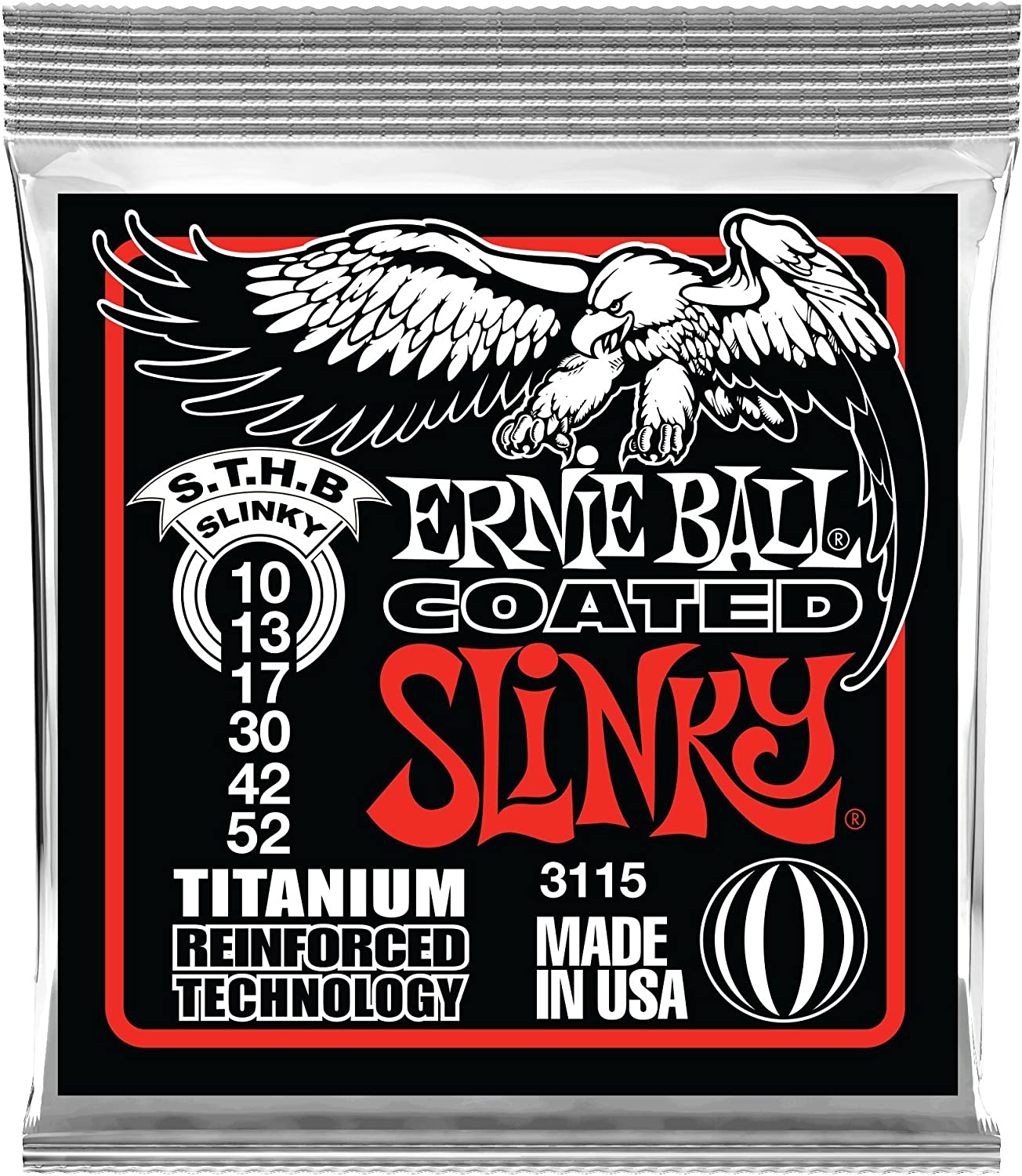
Ernie Ball’s Skinny Top Heavy Bottom Slinky Coated Titanium Electric Guitar Strings, with a gauge of 10-52, are designed for electric guitar players seeking a unique playing experience.
These strings feature a titanium reinforcement on the ball end, providing enhanced durability and tuning stability.
In addition, the wound strings are treated with a thin enamel layer that helps prevent decay and corrosion up to five times more effectively than uncoated sets.
In addition to the wound strings, each plain string boasts rust-resistant plating and a patented titanium wire reinforcement winding.
This innovative feature is designed to prevent string breakage and slippage, ultimately helping your guitar strings stay in tune better than conventional plain strings.
What sets these strings apart is their combination of skinny top strings (E, B, G) for easier shredding and heavy bottom strings (D, A, E) for a richer and thicker chord and rhythm-playing experience.
Crafted with coated nickel steel and an enamel finish, these strings balance durability and performance for electric guitar players.
- My Review
After trying out the Ernie Ball Skinny Top Heavy Bottom Slinky Coated Titanium Electric Guitar Strings in the 10-52 gauge, I can say that they provide a unique playing experience for electric guitarists.
The strings’ construction combines skinny top strings for easier shredding and heavy bottom strings for a richer and thicker chord and rhythm-playing experience.
The titanium reinforcement on the ball end of each string enhances durability and tuning stability, which I found to be quite impressive.
Additionally, the wound strings are treated with a very thin layer of enamel, effectively preventing decay and corrosion up to five times more than uncoated sets.
This feature is particularly helpful for guitarists who may have issues with sweat or acidic hands.
However, I did notice that the corrosion-resistant plating on the plain strings wasn’t as effective as I had hoped.
Over time, some corrosion and roughness were still present, which may concern those with particularly corrosive hands.
It’s worth noting that the titanium reinforcement, while helpful in preventing breakage and slippage, might not significantly impact the overall sound quality of the strings.
Speaking of sound quality, the coated nickel steel material and enamel finish provide a balanced tone, but it’s not the same as uncoated strings.
If you’re used to uncoated strings, you might notice a slight difference in the sound produced by these coated strings.
Here are the ratings I’ll give to the Ernie Ball Skinny Top Heavy Bottom Electric Guitar Strings:
As for playability, these strings feel comfortable under the fingers and offer a good balance between ease of bending and stability for chord and rhythm playing.
While the coated strings may not be the perfect fit for every guitarist, they provide a solid option for those seeking a durable, corrosion-resistant set of strings that still deliver a decent playing experience and tonal quality.
- Pros:
- Enhanced durability and tuning stability.
- Corrosion-resistant wound strings.
- Unique skinny top, heavy bottom design.
- Cons:
- Plain strings’ corrosion resistance lacking.
- Sound quality differs from uncoated strings.
- Titanium reinforcement’s impact debatable.
My final verdict is that the Ernie Ball Skinny Top Heavy Bottom Slinky Coated Titanium Electric Guitar Strings offer a unique playing experience with enhanced durability and tuning stability.
However, the corrosion resistance of plain strings and the sound quality compared to uncoated strings may not be ideal for all guitarists.
These strings are a solid option for those seeking a durable and corrosion-resistant set, but they might not be the perfect fit for everyone.
DUNLOP DEN1356 Nickel Wound Electric Guitar Strings
Amazing strings for superior sound quality.
Dunlop Manufacturing offers 50 years of experience in crafting world-class picks, analog electronics and accessories for musicians. Their products provide legendary and modern sounds for an exceptional playing experience.
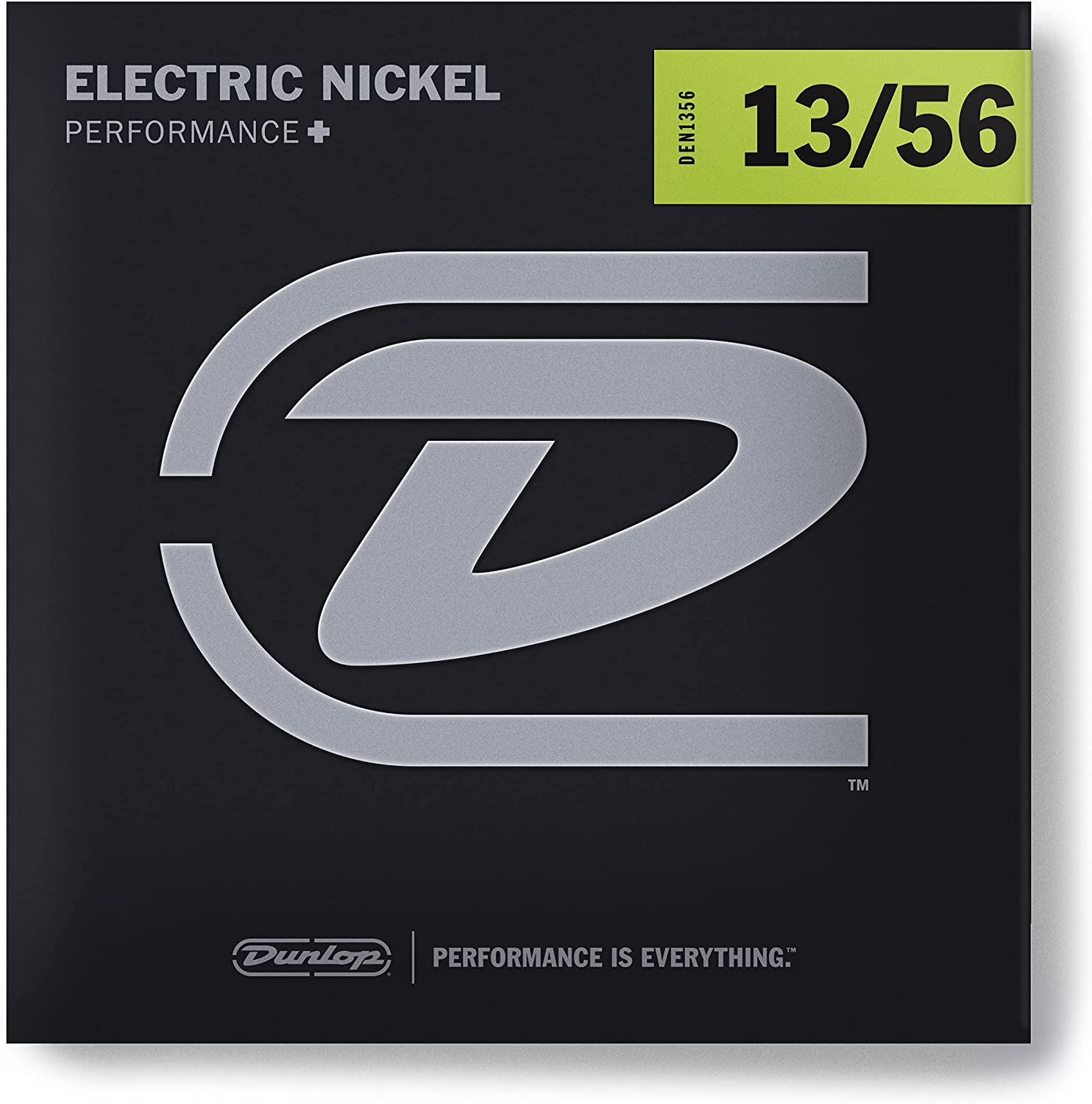
The JIM DUNLOP DEN1356 is a set of extra heavy nickel-wound electric guitar strings with a gauge range of .013 to .056.
This pack has six strings, making it suitable for various electric guitars.
These strings are manufactured in the United States and are designed to provide excellent durability and sound quality.
As an instrument parts and accessories product, the package includes one set of strings and has dimensions of 10.8 cm (L) x 11.2 cm (W) x 1.6 cm (H).
Created by Dunlop Manufacturing, a company with 50 years of experience in producing top-notch gear for musicians, these strings are ideal for those seeking reliable and high-quality accessories for their instruments.
Dunlop is well-known for their dedication to innovation and consistently producing perfect picks, analog electronics, and other accessories that set industry standards.
Many legendary musicians and current superstars have chosen Dunlop products for their performances, making these strings an excellent choice for guitarists seeking the perfect balance of quality and performance.
- My Review
I recently had the opportunity to try out the JIM DUNLOP DEN1356 Nickel Wound Electric Guitar Strings, and I must say I was quite impressed.
As an extra heavy set with gauges ranging from .013 to .056, these strings provide excellent durability and sound quality, making them suitable for various electric guitars.
Having used these strings on my 25.5-inch scale guitar, tuned down to C# tuning, I found that they maintained their tuning very well and produced a rich, beefy tone.
In addition, the higher string tension was perfect for combating the lowered tension from the lower tuning.
I didn’t need to make any major adjustments to my guitar’s neck tension or intonation.
One thing that stood out to me was the thoughtful selection of gauges in this set, which included four wounds and two plain strings.
This combination resulted in a well-balanced feel and even tension across all strings, making them comfortable to play despite their larger gauge size.
The packaging of these strings was also a pleasant surprise.
The sealed plastic package ensures that the strings stay fresh and corrosion-free, even if you have a few sets stored away for future use.
In addition, the colored ball ends make it easy to identify each string during restringing, a small but appreciated detail.
On the downside, the strings’ thickness may not be ideal for some players who prefer a lighter gauge for easier bends and faster play.
Again, however, this personal preference should not be considered a major drawback.
Here are the ratings I’ll give to the DUNLOP DEN1356 Nickel Wound Electric Guitar Strings:
In my experience, the JIM DUNLOP DEN1356 strings are a reliable and high-quality choice for guitarists looking to achieve a heavier sound and increased string tension.
In addition, their durability, tuning stability, and well-balanced feel make them a worthy investment for those considering switching to a heavier gauge string set.
- Pros:
- Durable and high-quality strings.
- Well-balanced tension and feel.
- Corrosion-resistant packaging.
- Cons:
- May be too thick for some players.
- Limited to heavier playing styles.
- Requires adjustment for standard tuning.
My final verdict is that the JIM DUNLOP DEN1356 Nickel Wound Electric Guitar Strings are a high-quality and reliable choice for guitarists seeking a heavier sound and increased string tension.
With their durability, well-balanced feel, and corrosion-resistant packaging, these strings are a great investment for players exploring heavier gauges and styles.
Ernie Ball Skinny Top Heavy Bottom Slinky Electric Guitar Strings
Ernie Ball M-Steel strings for superior sound and playability.
Ernie Ball’s M-Steel strings provide a rich, full tone with a powerful low-end response, hassle-free installation, and maximum tuning stability for electric guitar players. The strings feature a patented Super Cobalt alloy wrap, maraging steel hex core wire, nickel-plated brass ball-ends, and reinforced steel wrap wire.
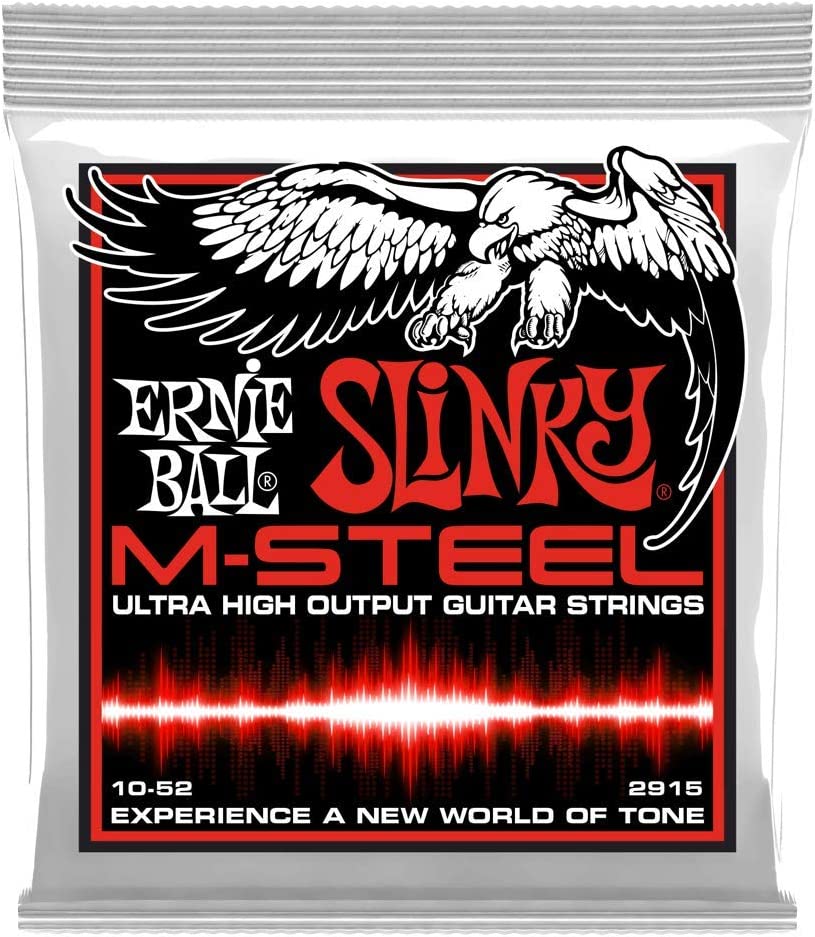
Ernie Ball’s Skinny Top Heavy Bottom Slinky M-Steel Electric Guitar Strings in 10-52 Gauge are unique strings designed to provide a rich, full tone and powerful low-end response.
These strings are constructed using a special Super Cobalt alloy wrapped around a Maraging steel hex core wire, enhancing magnetic attraction and expressive qualities.
These strings are made in California, USA, using only the finest and freshest materials to ensure optimal performance.
To prolong string life and maintain freshness, they come in Element Shield Packaging.
This set of strings is tailored for electric guitars and comes in a custom gauge with a special M-Steel material type.
This set’s plain electric guitar strings are also made from specially tempered steel, offering maximum fatigue resistance.
They also feature a patented winding of steel around the ball end, which reduces slippage and breakage, and helps the strings stay in tune better than traditional plain strings.
- My Review
After trying out the Ernie Ball Skinny Top Heavy Bottom Slinky M-Steel Electric Guitar Strings in 10-52 Gauge, I must say that I found them to be a high-quality product with several notable features.
As someone who appreciates a powerful and expressive sound, these strings truly delivered.
Using a Super Cobalt alloy wrapped around a Maraging steel hex core wire provided a rich, full tone and an undeniably impressive low-end response.
While using these strings, I noticed that the plain electric guitar strings were made from specially tempered steel, which offered maximum fatigue resistance.
This was evident as I played for extended periods without experiencing any discomfort or issues.
Additionally, the patented steel winding around the ball end helped reduce slippage and breakage, and I found that my guitar stayed in tune much better than with traditional plain strings.
One aspect that stood out was the Element Shield Packaging, which helped prolong string life and kept the strings feeling fresh.
As a guitarist, I truly appreciated this attention to detail in preserving the quality of the strings.
On the other hand, I did find the initial texture of the strings to be a bit rougher than I was accustomed to, but after some playing, they became smoother and more comfortable.
While using these strings, I experimented with various styles of music and discovered that they excelled in providing a crisp and clear sound, particularly when playing hard rock and metal.
Even when using heavy effects, the strings maintained their clarity and tone.
However, the bright sound may not be suitable for some genres or preferences, so keeping that in mind is essential.
Here are the ratings I’ll give to the Ernie Ball Skinny Top Heavy Bottom Slinky Electric Guitar Strings:
In my experience, the Ernie Ball Skinny Top Heavy Bottom Slinky M-Steel Electric Guitar Strings proved to be a valuable addition to my guitar setup.
Despite the initial roughness, their durability, tone, and overall performance made them a worthwhile investment for any guitarist seeking a powerful and expressive sound.
- Pros:
- Rich, full tone and powerful low-end.
- Increased output and durability.
- Element Shield Packaging for freshness.
- Cons:
- Initially rough texture on strings.
- Bright sound not for all preferences.
- Potential breakage issues for some users.
My final verdict is that the Ernie Ball Skinny Top Heavy Bottom Slinky M-Steel Electric Guitar Strings are a solid choice for guitarists seeking a powerful and expressive sound.
Their unique material and construction offer a rich tone, increased durability, and impressive sustain.
While the initial rough texture may be a drawback for some, the overall performance and quality of these strings make them a worthwhile investment for any guitarist.
D’Addario NYXL1260 Electric Guitar Strings Extra Heavy
Unrivaled strength and tuning stability for electric guitars with Players Circle rewards.
NYXL strings offer higher break strength, enhanced tuning stability, and accentuated mid-range frequency response for electric guitar and bass. D’Addario’s advanced machinery and processes forge NY steel for unmatched stability, Hex Core Construction for six sides of stability, and Fusion Twist Technology for maximum tuning stability. Players Circle rewards free stuff, merchandise and swag when registering your Players Circle code from your package.
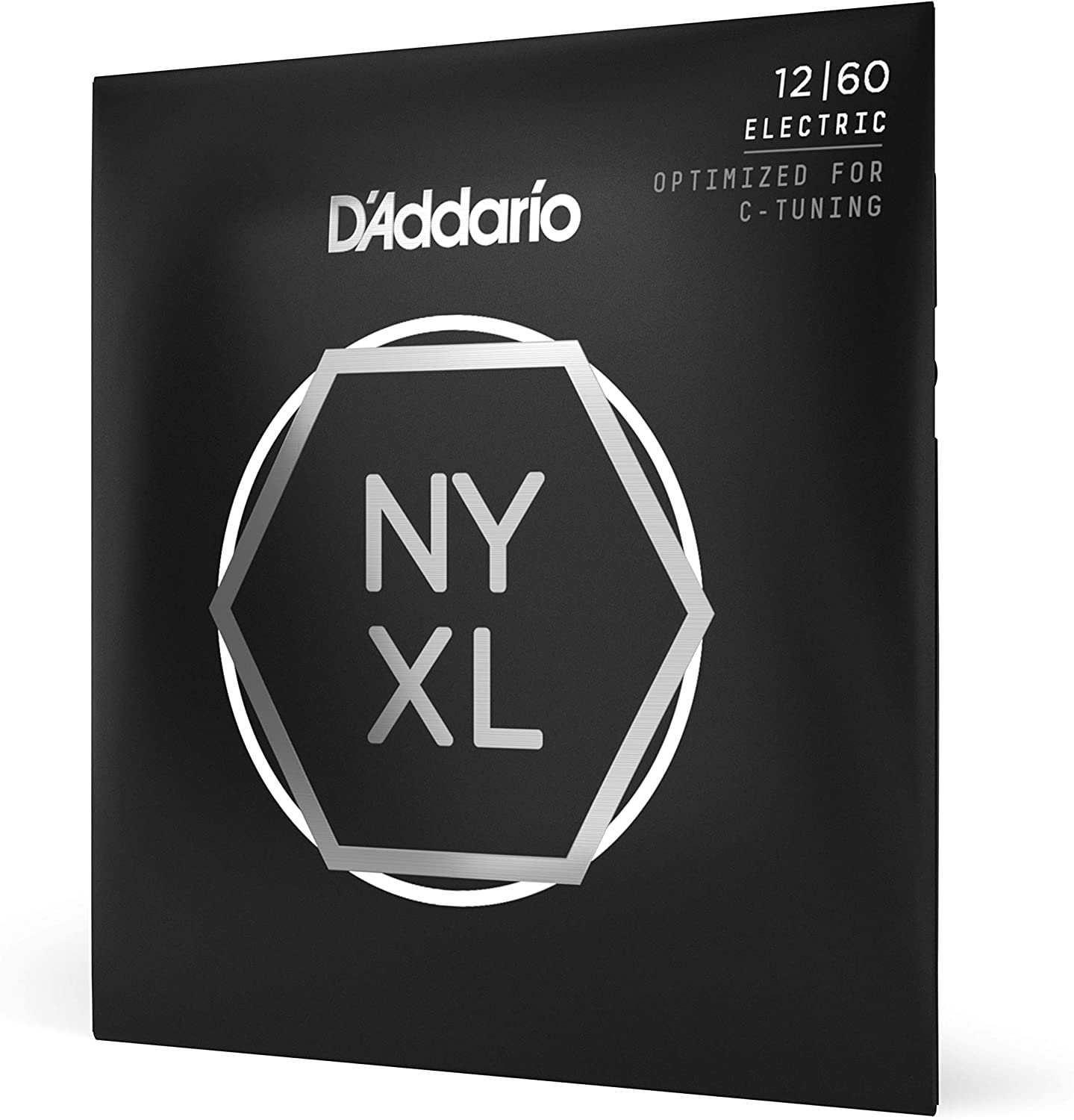
D’Addario NYXL Electric Guitar Strings are high-quality strings with superior performance and durability.
These premium uncoated strings are known for their remarkable strength, tuning stability, and enhanced mid-range, making them an excellent choice for guitar players of all levels.
Constructed with a nickel-plated steel wrap wire, the NYXL strings offer an increased frequency response in the 1-3.5 kHz range, allowing more presence and crunch to cut through the mix.
In addition, their fusion twist technology ensures that the strings stay in tune 131% better than standard strings, while the NY Steel core wire makes them up to 40% stronger.
These strings are also part of D’Addario’s Players Circle rewards program, so you can earn points with each purchase.
Proudly made in the USA, the NYXL electric guitar strings are crafted precisely at the company’s New York production facility.
Designed for 6-string guitars, this particular set – the NYXL1260 – features an extra heavy 12-60 gauge, providing a rich, powerful sound.
With their exceptional quality and performance, D’Addario NYXL electric guitar strings are an excellent investment for any guitarist.
- My Review
As a guitarist with years of experience, I had the opportunity to try out the D’Addario NYXL Electric Guitar Strings, specifically the extra heavy 12-60 gauge.
Upon first impression, I immediately noticed these strings’ superior quality and feel.
In addition, the tuning stability and enhanced mid-range frequency response were impressive, providing a rich and powerful sound.
The nickel-plated steel wrap wire contributes to a more accentuated presence and crunch, allowing my guitar to cut through the mix effortlessly.
I particularly appreciated the fusion twist technology, which ensured the strings stayed in tune much better than the standard strings I’ve used.
I also found the NY Steel core wire’s strength a bonus, making the strings more resistant to bending and breaking.
One of the standout features of these strings is their smooth, almost velvety feel.
They made playing more enjoyable and offered a unique experience compared to other brands I’ve tried.
In addition, the increased tonal stability made fine-tuning my instrument’s intonation easier, which is always a plus.
However, there were a few minor drawbacks.
While the strings are strong and durable, I did experience a string breakage early on.
Additionally, the packaging could be improved, as the strings are wrapped in pairs, making it difficult to replace just one string without unwrapping another.
Despite these minor issues, I found the D’Addario NYXL Electric Guitar Strings to be an exceptional product.
Their overall performance, feel, and sound quality far outweigh the drawbacks.
- Pros:
- Superior tuning stability.
- Enhanced mid-range frequency response.
- Smooth, velvety feel.
- Cons:
- Potential early string breakage.
- String packaging could be improved.
- Premium price point.
While they come at a premium price, I believe the investment is well worth it, considering their durability and the unique playing experience they offer.
I highly recommend these strings to any guitarist looking for high-quality, reliable strings that deliver outstanding results.
Here are the ratings I’ll give to the D’Addario NYXL1260 Electric Guitar Strings Extra Heavy:
My final verdict is that the D’Addario NYXL Electric Guitar Strings are a high-quality and reliable choice for guitarists seeking superior performance, durability, and a unique playing experience.
Despite minor drawbacks, their exceptional tuning stability, mid-range frequency response, and smooth feel make them worth the investment.
Dunlop Heavy Core Heaviest Electric Guitar Strings
Heavy-duty strings with rust-resistant VCI protection for drop tunings.
Dunlop Heavy Core strings enable players to “dig in” when playing dropped or lowered tunings, providing tight low end and focused mids, even when playing distorted. VCI paper envelopes keep strings fresh and rust-free with invisible protection.
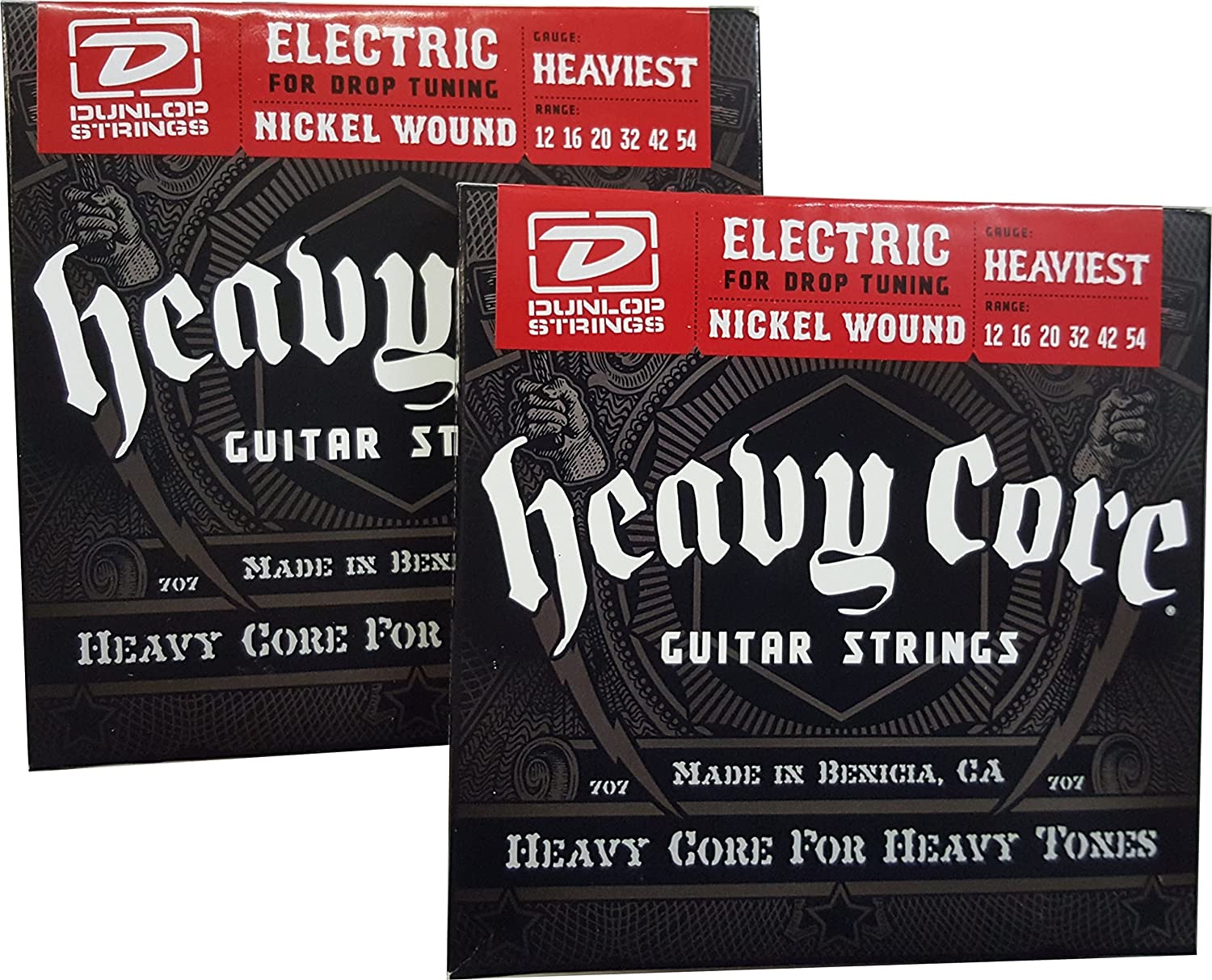
Dunlop’s Heavy Core Heaviest Electric Guitar Strings, available in a 2-pack with a gauge of 12-54, are designed particularly for musicians who prefer playing in dropped or lowered tunings.
Manufactured in Benicia, California, these strings boast a unique core wire and proprietary wrap ratios, allowing players to “dig in” while maintaining a balanced and tight sound across the low-end, midrange, and top-end frequencies, whether playing clean or with distortion.
These strings’ additional features are their VCI (Vapor Corrosion Inhibitor) paper envelopes, which replace the traditional plastic bag and desiccant packaging.
The VCI technology is integrated into the paper, providing a protective barrier around the strings to prevent moisture and rust from damaging them.
This ensures the strings remain fresh and untarnished when removed from the package.
These Dunlop guitar strings are ideal for musicians who require durability, precise sound, and easy installation, especially for those using low tunings on their guitars.
- My Review
As a guitarist who frequently plays in dropped and lowered tunings, I found Dunlop’s Heavy Core Heaviest Electric Guitar Strings perfectly suited for my needs.
When I first installed these strings on my guitar, I immediately noticed the unique core wire and proprietary wrap ratios that allowed me to dig into my playing while maintaining a balanced sound across the low-end, midrange, and top-end frequencies.
Whether I was playing clean or with distortion, these strings delivered a tight low end and a focused midrange, which provided a smooth top-end sound.
One feature that stood out to me was the VCI (Vapor Corrosion Inhibitor) paper envelopes that the strings came in.
This innovative packaging protected the strings from moisture and rust, ensuring they remained fresh and untarnished when I took them out of the package.
I appreciated this attention to detail, demonstrating Dunlop’s commitment to delivering a high-quality product.
After playing these strings for several months, I found them quite durable, maintaining their quality and sound without requiring frequent replacements.
Installation was simple, thanks to the smaller guide at the end of the strings, which made it easy to thread them through the tailpiece.
However, I did encounter a minor issue with the thickest string, which produced a metallic ring.
I suspect this may be due to my string replacement skills rather than a fault with the product itself.
Here are the ratings I’ll give to the Dunlop Heavy Core Heaviest Electric Guitar Strings:
In my experience, these Dunlop guitar strings are ideal for musicians requiring durability, precise sound, and ease of installation, particularly those using low tunings.
While the metallic ring had a slight issue, I found the Dunlop Heavy Core Heaviest Electric Guitar Strings a reliable and high-quality option for guitarists who play in dropped or lowered tunings.
- Pros:
- Designed for dropped/lowered tunings.
- Durable and long-lasting.
- VCI paper envelope packaging.
- Cons:
- Metallic ring on thickest string.
- Tight fit on some guitar models.
- No significant cons reported.
My final verdict is that the Dunlop Heavy Core Heaviest Electric Guitar Strings are excellent for guitarists who frequently play in dropped or lowered tunings.
The strings offer durability, quality material, great tone, sustain, resonance, and intonation, making them a reliable and high-quality option for musicians.
Ernie Ball 6-String Baritone Slinky Nickel Wound Strings
Ernie Ball strings for electric, bass and acoustic guitars, made with best materials for superior sound.
Ernie Ball provides reliable, quality strings for electric and acoustic guitars and basses, straps, cables, pedals, and accessories, offering players an unparalleled palette of expressive options. World-class players have used Ernie Ball strings since 1962 to create their unique sound.
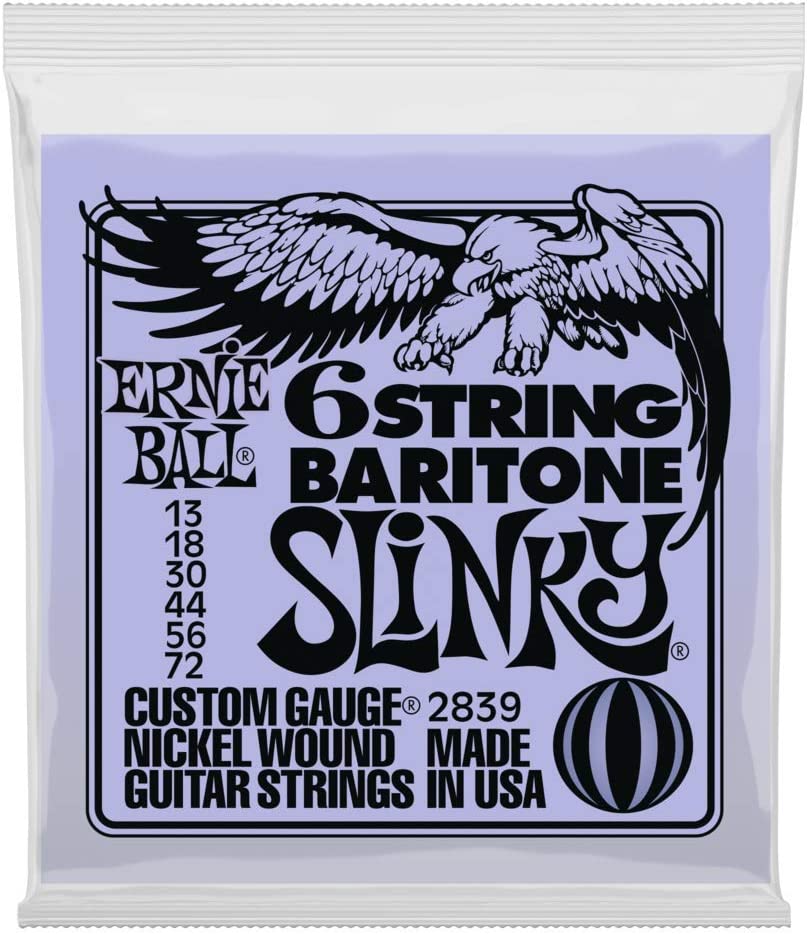
This product is a set of Ernie Ball 6-String Baritone Slinky Nickel Wound Electric Guitar Strings with a gauge of 13-72 (P02839).
These strings are specifically designed for baritone guitars and feature small ball ends.
Manufactured in California, USA, using high-quality and fresh materials, these strings offer a well-balanced tone that many accomplished guitarists have come to appreciate.
The Ernie Ball brand is renowned for its high-quality guitar and bass strings, used by legendary musicians like Paul McCartney, Keith Richards, Eric Clapton, Slash, Jimmy Page, and Buddy Guy.
These strings are made of nickel steel, providing excellent durability and performance.
The extra heavy string gauge suits bass guitar and electric guitar players who prefer a thicker string for a more robust sound.
Furthermore, these strings are designed to provide an extensive range of expressive options, allowing musicians to explore various styles and techniques.
With a long history of producing top-notch guitar accessories, Ernie Ball is a reliable choice for any guitarist who upgrades their strings.
- My Review
After trying out the Ernie Ball 6-String Baritone Slinky Nickel Wound Electric Guitar Strings (13-72 gauge), I must say that they have exceeded my expectations in terms of sound quality and durability.
As a guitarist who appreciates a well-balanced tone, these strings have truly delivered on that front.
The nickel steel material in these strings ensures longevity and consistent performance, making them a reliable choice for any musician.
When I first put the strings on my baritone guitar, I noticed how they offered a slightly thicker feel, which I found perfect for achieving a more robust sound.
Although the extra heavy gauge might take some getting used to, especially for those with sensitive fingers, I believe the tone trade-off is well worth it.
The strings have a slinky feel that makes playing both comfortable and enjoyable.
One thing to consider when using these strings is that they might not fit all baritone guitars or those with specific hardware, such as a Bigsby setup.
It is essential to ensure that these strings are compatible with your instrument before purchasing.
Additionally, if you plan on tuning your guitar to a higher register, these strings may not be the most suitable choice due to their thickness and tension.
As for the performance, I found that these Ernie Ball strings maintained their brightness and tone even after extended periods of heavy playing.
This is a testament to the quality and craftsmanship that the brand is known for.
While these strings may require some adjustments to your guitar’s neck and intonation, the result is a rich, full sound that is both satisfying and inspiring.
Here are the ratings I’ll give to the Ernie Ball 6-String Baritone Slinky Nickel Wound Strings:
In my experience with the Ernie Ball 6-String Baritone Slinky Nickel Wound Electric Guitar Strings, I am genuinely impressed with their quality and performance.
Despite some potential compatibility issues, these strings are an excellent choice for musicians seeking a well-balanced, durable, and expressive set of strings for their baritone guitars.
- Pros:
- Well-balanced tone.
- Durable nickel steel material.
- Comfortable slinky feel.
- Cons:
- May not fit all baritone guitars.
- Extra heavy gauge requires adjustment.
- Not suitable for higher tunings.
My final verdict is that the Ernie Ball 6-String Baritone Slinky Nickel Wound Electric Guitar Strings are a high-quality, reliable choice for musicians seeking a well-balanced tone and durable strings for their baritone guitars.
With excellent sound, material, and overall performance, these strings are a worthwhile investment for any guitarist looking to enhance their playing experience.
D’Addario NYXL Electric Guitar Strings
Unrivaled strength, tuning stability, and mid-range for electric guitar strings.
NYXL strings offer 131% more tuning stability, more punch and crunch, and the ability to bend further, providing an unmatched feel and tone. With advanced machinery, hex core construction, and fusion twist technology, D’Addario delivers superior products with superior rewards with the Players Circle membership.
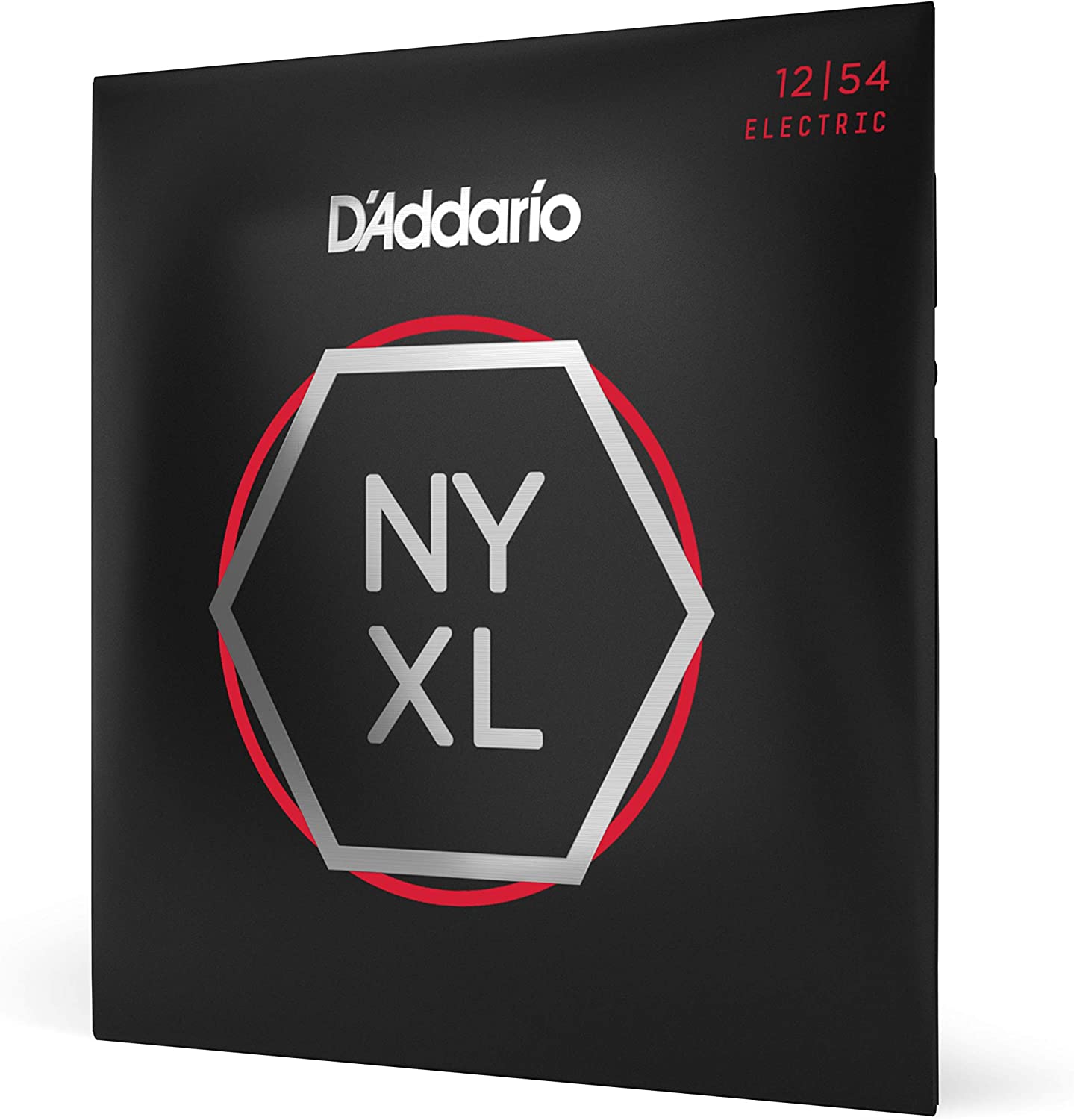
D’Addario’s NYXL Electric Guitar Strings are a top-notch choice for guitarists looking for high-quality, dependable strings.
These strings are produced in the United States and are designed to provide exceptional strength, tuning stability, and an enhanced mid-range tone.
These guitar strings are made from premium nickel-plated steel wrap wire, which enables them to deliver a powerful and crisp sound, particularly in the 1 – 3.5 kHz range.
This allows for more presence and crunch, enabling your guitar to stand out in any mix.
One of the standout features of these strings is their NY Steel core wire, which increases their strength by up to 40%.
This means that even when bent two whole steps higher, the NYXL strings are still far from their breaking point.
In addition, their Fusion Twist technology ensures that these strings stay in tune 131% better than standard strings.
These strings come with a Players Circle code as a bonus, allowing you to earn reward points for every purchase.
D’Addario’s NYXL Electric Guitar Strings are available in a heavy gauge and are designed for use with 6-string guitars.
- My Review
As a guitarist with experience using various string brands, I recently tried out the D’Addario NYXL Electric Guitar Strings and was genuinely impressed by their performance.
Thanks to the nickel-plated steel wrap wire, these strings have a premium feel, which gives them an impressive mid-range tone and a powerful presence in the mix.
I noticed their exceptional tuning stability when I installed these strings on my 6-string guitar.
The Fusion Twist technology used in the NY Steel core wire truly made a difference, as I spent less time tuning and more time playing.
Even after extensive bending, the strings remained in tune and showed no signs of weakness.
One aspect that stood out to me was the enhanced mid-range frequency response.
As a result, my guitar’s sound was noticeably more vibrant and crisp, allowing it to cut through the mix effortlessly.
This feature is particularly useful for guitarists who want their instruments to stand out during performances or recordings.
The durability of these strings is another noteworthy quality.
I’ve been playing with them for quite some time now, and they show minimal signs of wear.
The tone remains bright, and I haven’t experienced any string breakage, which can be an issue with other brands.
The Players Circle, reward points program, is a nice bonus, allowing you to earn points for purchases or exclusive promotions.
It’s a small but appreciated perk for loyal customers.
However, one minor criticism I have is the packaging of the strings.
They come wrapped in pairs, which can be inconvenient if you need to replace just one string.
I would prefer to see them individually wrapped to avoid any potential tangling or bending during the unwrapping process.
Here are the ratings I’ll give to the D’Addario NYXL Electric Guitar Strings:
Despite this minor drawback, the D’Addario NYXL Electric Guitar Strings have exceeded my expectations in terms of performance, durability, and sound quality.
As a result, I highly recommend them to any guitarist seeking a reliable and high-quality string set for their instrument.
- Pros:
- Exceptional tuning stability.
- Enhanced mid-range frequency response.
- Impressive durability and strength.
- Cons:
- Paired string packaging inconvenient.
- Premium price point.
- No individual string wrapping.
My final verdict is that the D’Addario NYXL Electric Guitar Strings are a high-quality, reliable option for guitarists seeking exceptional performance in terms of tone, durability, and tuning stability.
The enhanced mid-range frequency response and sturdy material make these strings a standout choice.
Despite the premium price point and packaging inconvenience, I highly recommend them for serious guitar players.
Ernie Ball Not Even Slinky Nickel Wound Guitar Strings
Legendary tone with Ernie Ball Not Even Slinky strings.
Ernie Ball Slinky strings offer iconic sound, balance, and durability with a variety of options to fit any musician’s playing style. World renowned artists like Eric Clapton, the Rolling Stones, Jimmy Page, Slash, and Angus Young rely on the quality of Ernie Ball strings.
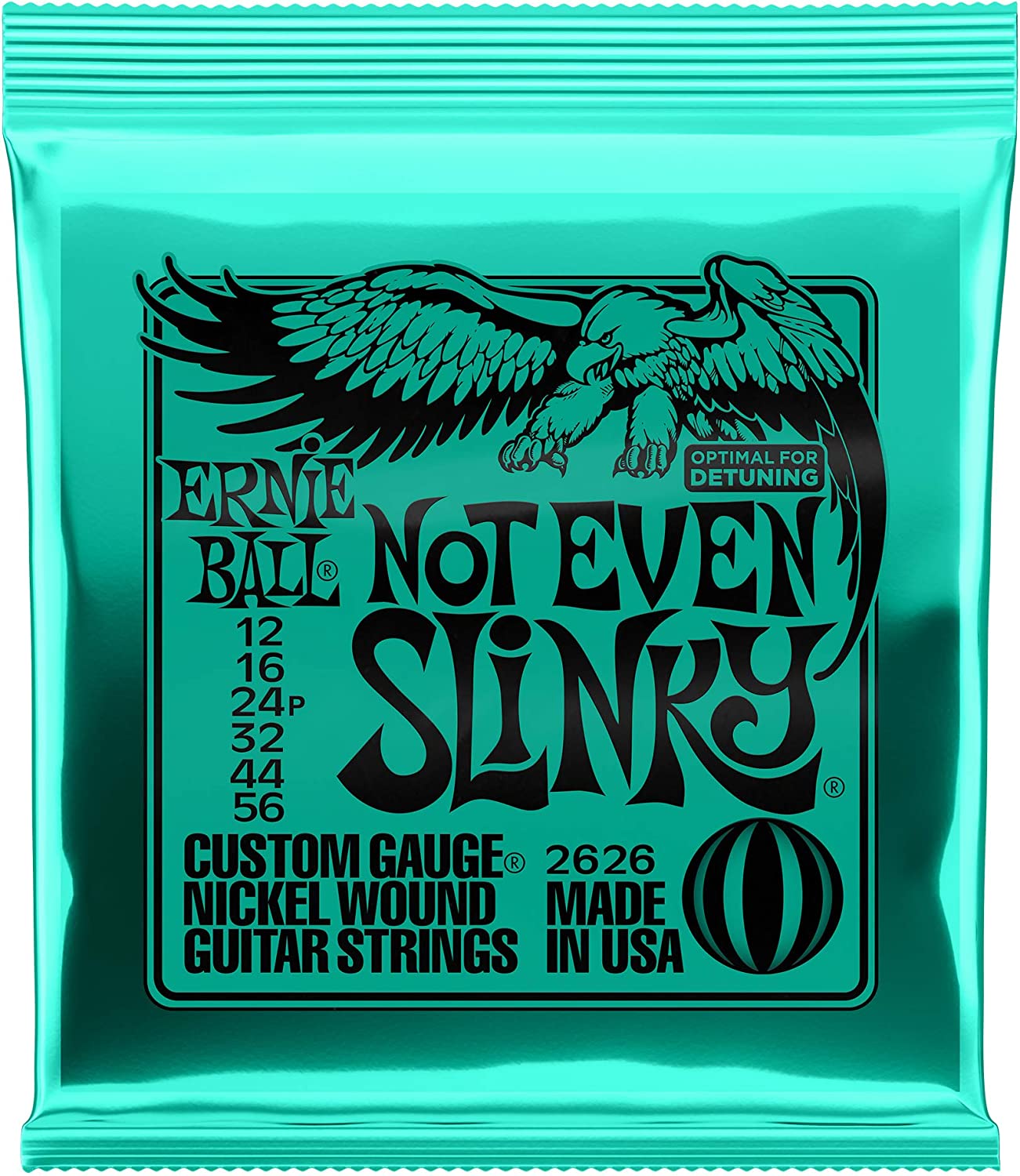
The Ernie Ball Not Even Slinky Nickel Wound Electric Guitar Strings are a set of high-quality strings with a gauge of 12-56, perfect for detuning.
These strings are made in California with top-notch materials to ensure consistent performance and longevity.
In addition, they boast a bright and balanced tone, making them popular among legendary guitarists such as Slash, Jimmy Page, and Eric Clapton.
These nickel wound strings contain nickel-plated steel wrapped around a tin-plated high-carbon steel core, delivering that iconic Slinky tone.
In addition, the plain strings feature a series of lock twists for added stability and strength, while the wound strings are precision-engineered for optimal sound.
Notably, Ernie Ball has been a leading manufacturer of strings and accessories since 1962, making it a trusted brand among musicians worldwide.
The product is a distinctive Not Even (12-56) color.
With Element Shield Packaging, these strings remain fresh and maintain their quality even during extended periods of use.
- My Review
As a guitarist, I recently tried the Ernie Ball Not Even Slinky Nickel Wound Electric Guitar Strings with a 12-56 gauge, and I must say, I was impressed with their performance.
These strings are designed for detuning and certainly deliver on that promise.
In addition, I found that the strings produced a bright, balanced tone suitable for various music genres, from rock to blues.
When I first installed these strings on my acoustic guitar, I noticed that the Element Shield Packaging had kept them fresh and in excellent condition.
The strings were easy to install and fit perfectly on my guitar.
In addition, the nickel-plated steel winding around the tin-plated high-carbon steel core gave the strings that classic Slinky tone I sought.
As I played my guitar, I could understand why many legendary guitarists like Slash and Jimmy Page prefer these strings.
They provided a smooth playing experience with a lot of flexibility for bends and vibrato.
However, I did notice that I needed to retune my guitar occasionally, especially after intense playing sessions or when using bends frequently.
One thing I appreciated was the durability of these strings.
Even after weeks of regular use, they maintained their bright and balanced tone, and I didn’t experience any string breakage.
This is a testament to the quality materials and manufacturing process Ernie Ball uses.
On the downside, I found that the strings could have been shinier, which might be a minor aesthetic concern for some players.
Additionally, I came across some plain strings with some rust right out of the package, but it was rare and could be attributed to a bad batch.
Here are the ratings I’ll give to the Ernie Ball Not Even Slinky Nickel Wound Guitar Strings:
In my experience, the Ernie Ball Not Even Slinky Nickel Wound Electric Guitar Strings are a reliable choice for guitarists seeking optimal performance, bright tone, and durability.
Any guitarist would find it worth investing in despite the need for occasional retuning and minor aesthetic issues, as the instrument’s playability and overall quality are commendable.
- Pros:
- Bright, balanced tone
- Durable and long-lasting
- Ideal for detuning
- Cons:
- Occasional retuning required
- Minor aesthetic issues
- Rare rust on plain strings
My final verdict is that the Ernie Ball Not Even Slinky Nickel Wound Electric Guitar Strings are a solid choice for guitarists seeking a bright, balanced tone and durability.
Their overall performance and quality outweigh the occasional retuning and minor aesthetic issues.
DR Strings DDT Guitar Strings 12-60 Extra Extra Heavy
High-quality, lock-in tuning strings for drop down tuning.
DDT strings provide perfect tuning at lower pitches with clear notes, while their stability ensures they stay in tune. Change tunings easily, as DDT’s lock right in and stay there.
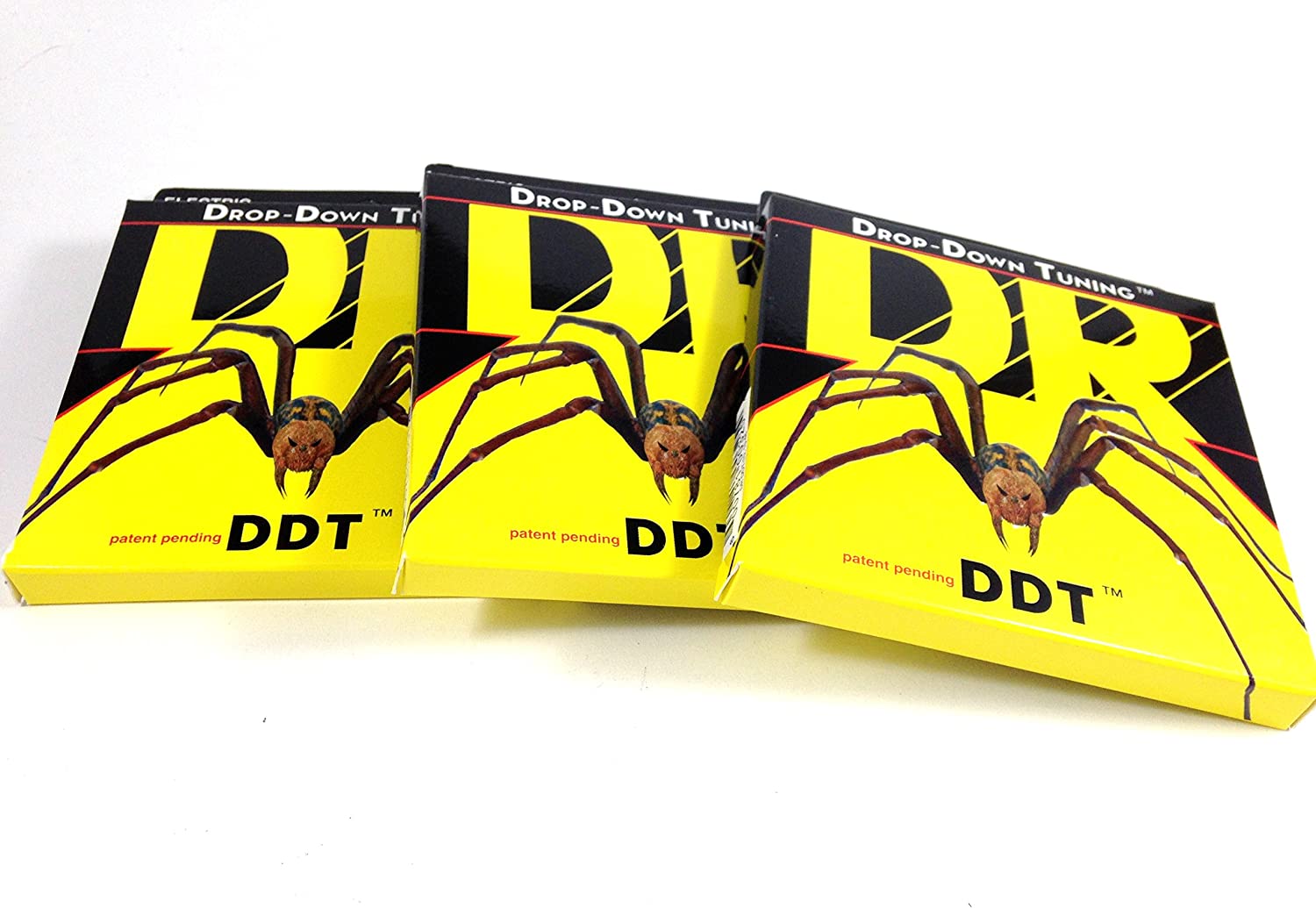
This product is a set of three packs of DR Guitar Strings specifically designed for electric guitars.
These extra-extra-heavy strings are crafted in the United States and are ideal for those who prefer drop-down tuning, but of course, they can also be used for standard tuning.
The strings come in gauges 12-16-20-38-52-60, providing a well-balanced feel for rhythm and lead playing.
One of the most notable features of these guitar strings is their remarkable tuning stability.
Once you’ve tuned your guitar, the strings lock into place and maintain their tuning, even when changing between different tunings.
This ensures you can deliver clean, clear, and in-tune notes at lower pitches without trouble.
Many guitarists find this stability impressive and useful during performances or recording sessions.
In addition to tuning stability, these strings offer a comfortable playing experience with the right tension.
The high strings are slightly less tense, making it easier to perform bends and smooth leads, while the low strings are heavy enough to handle fast, aggressive picking.
- My Review
As a guitarist, I’ve tried out the DR Guitar Strings 3 Pack Electric DDT Drop Down Tuning 12-60 Extra Extra Heavy, and I must say that they’ve impressed me with their performance.
Right from the start, I noticed that these strings quickly locked into tune and maintained their pitch remarkably well.
This was especially helpful when I changed between different tunings, as the stability allowed me to deliver clean and clear notes at lower pitches without any hassle.
Tuned to A standard, I found that the tension of the strings was just right – not too much, but enough to provide a satisfying playing experience.
The high strings had less tension, making it easier to execute bends and play smooth leads.
On the other hand, the low strings were heavy enough to handle fast and aggressive picking without any issues.
However, one aspect that could be improved upon is including a wound third string in the set.
This would make the strings even more versatile and better suited to my personal preferences as a guitarist.
Nevertheless, the quality of these strings is undeniable, and they hold up well even with constant use.
Made in the USA, these strings also stand out for their durability.
I’ve used them for quite some time now, and they have yet to show significant signs of wear or loss of tonal quality.
Again, this is a testament to the craftsmanship and materials used in their production.
Here are the ratings I’ll give to the DR Strings DDT Guitar Strings:
In my experience, the DR Guitar Strings 3 Pack Electric DDT Drop Down Tuning 12-60 Extra Extra Heavy set has proven to be a reliable and high-quality choice for electric guitar players, especially those who enjoy drop-down tuning.
Although there is always room for improvement, these strings offer a great balance of tension, stability, and tonal clarity, making them a worthwhile investment for any serious guitarist.
- Pros:
- Remarkable tuning stability.
- Well-balanced tension.
- Durable and high-quality.
- Cons:
- No wound third string.
My final verdict is that the DR Guitar Strings 3 Pack Electric DDT Drop Down Tuning 12-60 Extra Extra Heavy is an excellent choice for electric guitar players, particularly those who enjoy drop-down tuning.
The strings offer a great balance of tension, stability, and tonal clarity, making them a worthwhile investment for any serious guitarist.
What to consider before buying guitar strings for metal?
For metal guitarists, picking the perfect strings is an essential factor in achieving the heavy, powerful sounds that are characteristic of the genre.
In addition, the right strings can make all the difference in achieving the proper tonal quality, playability, and durability that metal playing demands.
– String Material
Different string materials produce unique tonal qualities and have varying levels of durability.
Some of the popular materials used in metal guitar strings are:
Nickel-plated Steel: This material is the most common for electric guitar strings, offering a balanced tone with good clarity, sustain, and brightness.
It’s suitable for various metal subgenres.
Stainless Steel: Stainless steel strings provide a brighter and more aggressive tone, which can be perfect for metal.
In addition, they are resistant to corrosion, increasing their lifespan.
Cobalt: Cobalt strings have a high output and dynamic feel, offering a brighter, more powerful tone perfect for metal.
They also have increased magnetic properties, which can improve the instrument’s overall response.
– Tension of the strings
Tension refers to the force required to stretch a guitar string to its proper pitch.
The tension level affects the feel and playability of the guitar.
Regular or Light Tension: Light tension strings require less force to fret, making them easier to play for some.
However, they may not offer the same level of aggression and sustain that metal playing requires.
Heavy or High Tension: High-tension strings need more force to fret but provide higher projection and tightness, ideal for aggressive metal styles.
They also stay in tune better during heavy bending and vibrato but could be more challenging for beginners.
When selecting the appropriate tension, consider your playing style and level of experience.
Experimenting with different tensions can help you discover the optimal balance of playability and performance.
– Coating type
Coated strings have a thin layer of polymer or other material that extends the string’s life by protecting it from corrosion and wear.
The two primary types of coatings are:
- Polymer: Most commonly used, polymer coatings provide a smooth feel and reduce finger noise.
However, they may slightly dampen the string’s brightness and harmonic complexity.
- Nanoweb: A thinner coating that preserves more of the string’s brightness and natural feel.
Nanoweb coatings are more expensive but can be worth the investment for some players.
– Gauge of the strings
Gauge refers to the thickness or diameter of a guitar string, which directly impacts its tension and tone.
Bridging the gap between heavy tone and playability is crucial for metal playing.
Light Gauge: Lighter gauge strings are easier to bend and fret, offering a smooth, fast-playing experience.
However, they may lack the sustain and tightness required in metal.
Medium Gauge: An excellent middle ground for players seeking playability and a powerful tone.
They offer some benefits of heavier strings without being too challenging to play.
Heavy Gauge: Heavy gauge strings provide better sustain, projection, and low-end chug associated with metal playing.
However, they are less forgiving and may result in increased finger fatigue.
Tuning and guitar scale length should also be considered when choosing a gauge.
Lower tunings and longer scale lengths may require thicker strings to maintain proper tension.
– Maintenance and durability
Playing metal often involves techniques that put a lot of wear on the strings, such as palm-muting, heavy bending, and tremolo techniques.
As a result, it’s crucial to consider the strings’ durability and how much maintenance they require to prolong their lifespan.
Cleanliness: Regularly cleaning your strings with a cloth or string cleaner can help prevent corrosion and increase their useful life.
Consider getting a string cleaner if you’re using uncoated strings.
Corrosion Resistance: Coated strings and stainless steel strings generally have better resistance against sweat and humidity, which can extend their lifespan without constant maintenance.
– Tone and projection
The tonal characteristics of a set of strings should match the desired sound for metal playing.
Some general tonal qualities to consider when choosing strings for metal include:
- Brightness and clarity: Heavy and down-tuned riffs can benefit from the treble presence and articulation of brighter strings, preventing the sound from becoming muddy.
- Tight Low-End response: Metal music often relies on fast, palm-muted riffs that necessitate a tight, controlled, low-end response.
The heavy gauge and high-tension strings can help achieve this sound.
Sustain and attack: Metal solos and leads require strings that produce long sustain and a sharp attack.
– Brand reputation and quality
With numerous brands available, selecting a reputable manufacturer known for producing high-quality strings is crucial.
Keep an eye out for professional musician endorsements and read reviews to understand the best brands for metal playing.
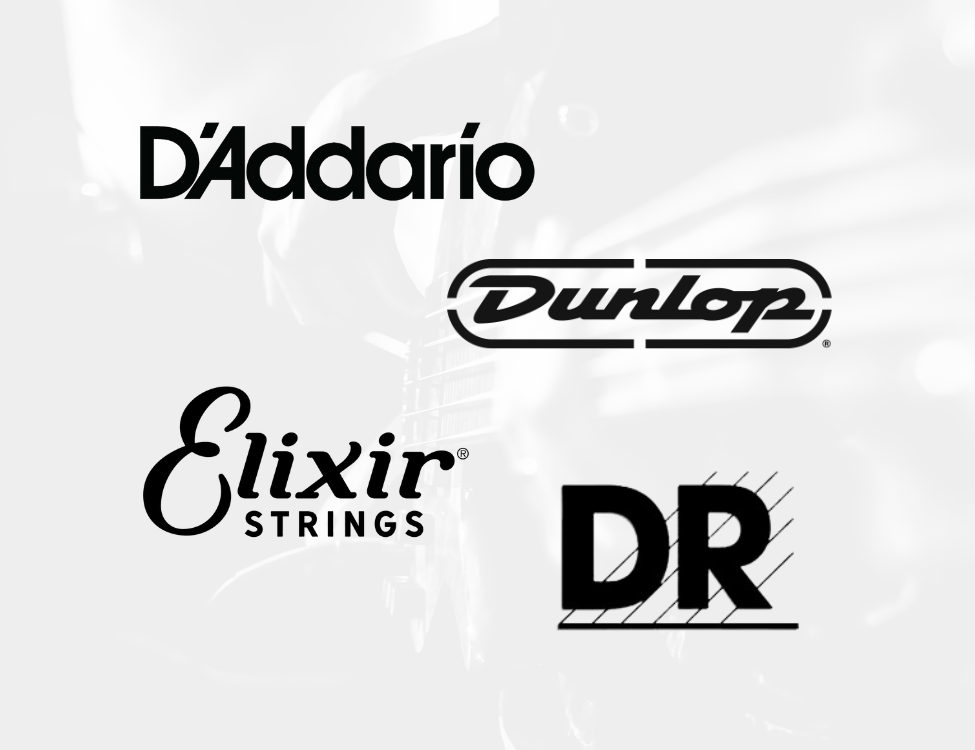
– Price and budget
Lastly, consider your budget when purchasing guitar strings.
Metal players should expect to change strings more frequently due to the aggressive playing style and techniques, so weighing the cost against other features like durability, coating, and brand reputation is essential.
When determining your budget for guitar strings for metal, consider factors such as how often you play, your desired sound quality, and the importance of durability.
If you play frequently or perform regularly, allocating a slightly higher budget for strings that offer better performance and longevity might be worthwhile.
On the other hand, if you play less frequently or are still in the early stages of learning, you may start with a more budget-friendly set of strings, gradually upgrading as your skills and needs evolve.
By considering your budget, playing habits, and desired sound quality, you can make an informed decision that ensures the best possible performance and value from your strings.
Remember, investing in a good set of strings can significantly enhance the sound and playability of your guitar, making it a worthwhile investment.
Are thicker gauge guitar strings better for metal?
The thickness or gauge of guitar strings plays a critical role in defining your instrument’s tone, playability, and overall feel.
Metal guitarists, particularly those belonging to sub-genres like extreme metal, thrash, and progressive metal, often seek a heavier, more aggressive tonality that matches their music’s intensity.
One factor often debated is whether thicker gauge guitar strings are better for metal.
In this discussion, we will assess the advantages and disadvantages of thick gauge strings about metal playing and whether they are the optimal choice for this genre.
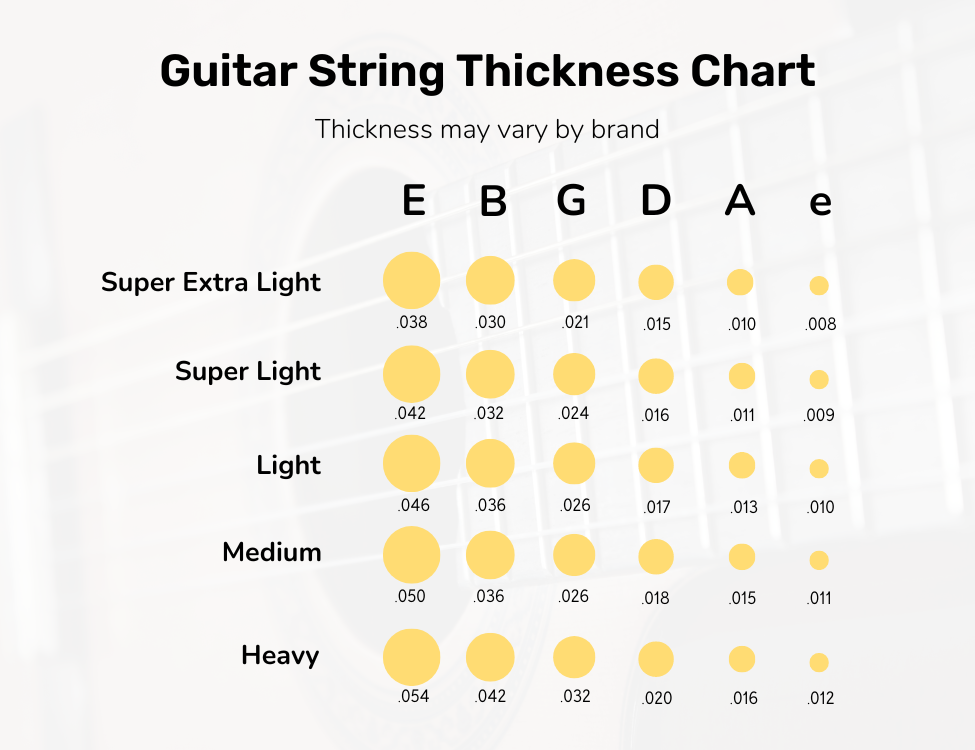
– Advantages of thicker gauge guitar strings for metal:
Improved tone and projection: One common reason metal guitarists opt for heavier gauge strings is the belief that they deliver a fuller, more powerful sound.
Thicker strings can provide better sustain, a stronger low-end response, and increased overall volume compared to lighter gauge strings.
These factors contribute to the aggressive, heavy tone synonymous with metal music.
String tension and stability: Metal players often use lower tunings to achieve a deeper, heavier sound.
Thicker gauge strings can maintain proper tension even when tuned down, improving intonation and tuning stability.
Furthermore, heavier gauge strings tend to remain more stable during fast palm-muted riffs and aggressive picking techniques commonly found in metal playing.
Durability: Heavier gauge strings are typically more durable, which is useful for metal guitarists since their aggressive playing styles often result in increased wear and tear on the strings.
This durability may extend the strings’ lifespan, saving money over time.
– Disadvantages of thicker gauge guitar strings for metal:
Difficulty in playability: One significant drawback of thicker gauge strings is that they can be more challenging to play, especially for beginners.
These strings require more finger strength and effort during chord changes, intricate lead playing, and bending.
This difficulty can have a negative impact on playability, making it challenging to perform fast-paced, complex metal riffs.
Finger fatigue: Playing on heavier gauge strings can also lead to increased finger fatigue due to increased tension.
During prolonged practice sessions or live performances, finger discomfort and fatigue may compromise technique and accuracy.
Suitability for specific guitar models: Not all guitars are built to handle heavier gauge strings.
Over time, using thick gauge strings on a guitar with a thinner neck or weaker construction can cause instrument damage, such as a warped neck.
It’s essential to ensure your guitar’s compatibility with the chosen string gauge before switching.
– Finding the Right Gauge for Metal:
As we’ve seen, there are pros and cons to using thicker gauge guitar strings for metal.
It ultimately comes down to finding the right balance between playability, sound, and personal preference.
Some metal guitarists may benefit from using thick gauge strings to achieve an aggressive, heavy tone. In contrast, others might prioritize playability and comfort by opting for lighter gauge strings or hybrids.
Additionally, the guitar type, scale length, and intended tuning should be considered when selecting the suitable gauge for metal playing.
For example, when using lower tunings, baritone guitars or those with longer scale lengths can maintain proper tension and tuning stability even with lighter gauge strings.
The best way to determine what works for you is through experimentation.
Try various string gauges and brands until you find the perfect balance between tone, playability, and comfort.
Furthermore, consult with other metal guitarists, read reviews and forums, and look for professional recommendations to help guide your choices.
What type of guitar string material is best for metal music?
When achieving the heavy, aggressive, and powerful sound typical of metal music, the type of guitar strings you choose can significantly impact overall performance.
Various factors come into play when selecting guitar strings, including gauge, tension, and coating.
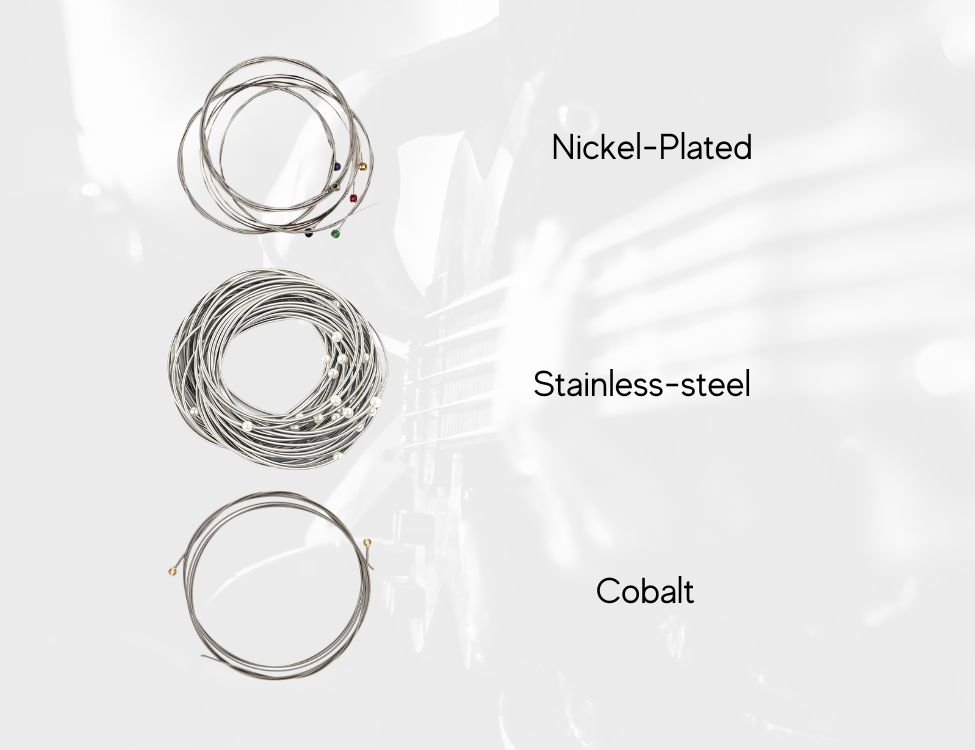
One key factor often debated among metal guitarists is the optimal material for their guitar strings.
We will examine the characteristics, pros, and cons of various guitar string materials commonly used in metal music, ultimately determining which is best suited for the genre.
– Nickel-Plated Steel
Nickel-plated steel is the most popular material for electric guitar strings across various genres, including metal.
These strings are made by wrapping a steel core with an outer winding consisting of a nickel and steel alloy.
They are favored for their balanced tonal properties, blending warmth and brightness with good clarity and sustain.
Pros:
- Balanced tone: Nickel-plated steel strings produce a balanced sound that works well with various metal sub-genres, from classic heavy metal to modern progressive styles.
- Versatility: These strings are well suited to various guitar types and pickups due to their balanced tonal characteristics.
- Affordability: Nickel-plated steel strings are typically more affordable than other materials, making them an attractive option for musicians on a budget or those who change their strings frequently.
Cons:
- Less aggression: While the balanced tone of nickel-plated strings can provide a clear and responsive sound, they may lack the aggressive tonality some metal guitarists require, particularly in heavier sub-genres such as death metal or extreme metal.
- Durability: Nickel-plated strings tend to oxidize and corrode faster than stainless steel or coated options, meaning they may require more frequent replacements.
– Stainless Steel
Stainless steel strings are an excellent alternative to nickel-plated steel, offering a unique tonal response that complements various metal styles.
Known for their bright, aggressive tone and corrosion resistance, stainless steel strings are popular among many metal guitarists.
Pros:
- Bright and aggressive tone: Stainless steel strings produce a brighter tonality with increased attack and presence, making them ideal for cutting through heavy distortion and providing the aggressive sound metal music demands.
- Corrosion resistance: Stainless steel strings are less prone to corrosion due to their composition, resulting in a longer string life and a consistently fresh sound.
- Low finger noise: Stainless steel strings typically produce less finger noise than nickel-plated strings, allowing for smoother, more precise slides and cleaner performance.
Cons:
- Harshness: The brightness and aggression associated with stainless steel strings can sometimes translate to excessive harshness.
- Price: Stainless steel strings are generally more expensive than nickel-plated strings, which can be a factor to consider for those on a budget.
– Cobalt
A newer option that has gained traction among metal guitarists is cobalt strings.
Featuring a cobalt alloy wrap, these strings provide a distinctive tonality and high output that metal players find appealing.
Pros:
- High output: Cobalt strings deliver a powerful, high-output sound well suited for metal music’s intensity.
- Warm and bright tonality: Cobalt strings combine warmth and brightness, producing a powerful and expressive sound ideal for various metal styles.
- Improved instrument response: Due to cobalt’s increased magnetic properties, these strings can enhance your guitar’s overall response and feel, delivering a more pleasing playing experience.
Cons:
- Price: Cobalt strings tend to be more expensive than their nickel-plated and stainless steel counterparts, which may be a drawback for budget-conscious guitarists.
- Durability: Cobalt strings are more corrosion-resistant than regular steel strings but may not last as long as other materials like stainless steel.
Although it might be difficult to pinpoint a distinct “best” material for metal music, certain attributes could make these string materials generally well-suited:
- Nickel-Plated Steel: A balanced and versatile option players appreciate across various metal styles. A great starting point for those seeking a reliable and affordable metal string.
- Stainless Steel: A more aggressive cutting tone with increased brightness and corrosion resistance. Ideal for metal guitarists who desire brighter sounds and longer-lasting strings.
- Cobalt: High output, balanced tonality, and improved instrument response. Best suited for those seeking a unique sound with higher output and dynamics.
Experimentation is key to finding your ideal string material, and it can be worth trying out each of these options to determine the perfect choice for your specific playing needs.
Remember that factors such as playing technique, guitar type, and amplifier settings also contribute significantly to your overall tone, so consider these elements when deciding.
Which are the most popular guitar string brands?
Some of the most popular guitar string brands have earned their reputation through consistent quality, innovation, and a wide range of options catering to different instruments, playing styles, and tonal preferences.
These brands are favored by professional musicians and enthusiasts alike, as they provide an excellent playing experience and enhance the sound of their guitars.
Some of the top brands in the market include D’Addario, Ernie Ball, Elixir, Dr Strings, and Dunlop each offering unique characteristics and product lines to suit various needs.
Let’s take a look at each of these individually:
– D’Addario
D’Addario is a leading guitar string manufacturer known for its innovative approach to materials and engineering.

They offer a diverse selection of strings for various instruments, including electric, acoustic, and classical guitars.
The NYXL, EXP, and Pro-Arté series are among their most popular product lines, catering to different playing styles and tonal preferences.
Made in the USA, D’Addario strings are praised for their consistent quality, durability, and performance.
The brand’s commitment to sustainability and eco-friendly practices further enhances its appeal among musicians.
– Ernie Ball

Ernie Ball has been a prominent name in the guitar world for decades, with their iconic Slinky series of electric guitar strings being a favorite among guitarists of all genres.
Their extensive product range includes strings for electric, acoustic, and bass guitars, offering various gauges and materials to suit different preferences.
Endorsed by numerous professional musicians, Ernie Ball strings are known for their playability, tone, and longevity.
Popular product lines include Slinky, Cobalt, and Earthwood, each providing unique tonal characteristics.
The brand’s continued dedication to quality and innovation has solidified its position as a top choice for guitarists worldwide.
– Elixir

Elixir revolutionized the guitar string market with their patented coated string technology, providing longer-lasting tone and durability compared to traditional uncoated strings.
They offer strings for electric, acoustic, and bass guitars, with popular series such as Nanoweb, Polyweb, and Optiweb, each featuring different coating materials and tonal properties.
Elixir’s coated strings have garnered a loyal following of guitarists who appreciate their extended lifespan and consistent performance.
The brand’s focus on innovation and quality has made it a go-to choice for players seeking long-lasting strings with minimal maintenance.
Elixir’s commitment to enhancing the guitar playing experience has earned them a well-deserved reputation in the industry.
– Dr. Strings
Dr. Strings, also known as DR Handmade Strings, is a New Jersey-based company that manufactures high-quality guitar strings for bass, electric, and acoustic guitars.

The company was founded by Mark Dronge in 1989, aiming to create handmade strings that offer excellent tone, durability, and playability.
Dr. Strings are crafted using a unique and patented winding process that utilizes machinery designed and built in-house.
The process involves hand-winding the strings on a hexagonal core, which provides a tighter wrap and delivers a longer-lasting string with increased sustain and tone.
The company offers various products, including strings for electric, bass, and acoustic guitars and stringed instruments like banjos and mandolins.
Some of their popular guitar string series are Hi-Beam, Sunbeam, Pure Blues, and Tite-Fit.
Many renowned musicians and bands use Dr. Strings, including Darryl Jones (Rolling Stones), Jeff Ament (Pearl Jam), and Stefan Lessard (Dave Matthews Band), among others.
– Dunlop
Dunlop Manufacturing, Inc. is a California-based company started in 1965 by Jim Dunlop.
Initially focused on manufacturing high-quality guitar accessories, such as capos and slides, Dunlop has expanded to become one of the leading manufacturers of musical instrument strings, pedals, and picks.

Dunlop Strings are manufactured using state-of-the-art machinery, advanced materials, and thorough testing processes.
The company uses diverse materials and gauges to produce strings that cater to various playing styles and preferences.
They offer high-quality strings for electric, acoustic, bass guitars, and other instruments.
Dunlop’s string product line consists of multiple series designed for different tones and playing styles.
Some popular series include the Performance+ Series, the Electric Nickel Wound series, and the Phosphor Bronze Acoustic series.
They also offer specialty strings, such as the Robert Trujillo Icon Series Bass Strings and the Billy Gibbons Reverend Willy’s Electric Guitar Strings.
Dunlop Strings are endorsed by numerous professional players, including Slash (Guns N’ Roses), Jerry Cantrell (Alice in Chains), and Zakk Wylde (Black Label Society, Ozzy Osbourne).
The company is also known for collaborating with musicians to create signature guitar strings.
What’s the difference between coated and uncoated strings?
I understand the confusion and curiosity that beginners have when choosing between coated and uncoated strings.
It happened to me at one point that I had no idea what either of these terms meant.
Let’s dive deep into the differences between these two types of strings, so you can make an informed decision about which ones are right for you.
Coated strings have a thin layer of material, usually a polymer, covering the outer surface of the string.
This coating protects the metal from dirt, sweat, and other contaminants that can degrade the string’s quality over time.
Some brands use proprietary coatings, like Elixir’s NANOWEB or POLYWEB.
One of the primary advantages of coated strings is their extended lifespan.
The protective coating shields the strings from dirt, sweat, and other contaminants, reducing corrosion and wear.
This helps maintain their tone and playability for a longer period.
Additionally, coated strings offer a smoother playing experience, as the coating reduces finger noise and fret-hand friction, making them ideal for beginners or those who prefer a more comfortable feel.
Uncoated strings, on the other hand, lack this protective layer, leaving the metal exposed to the elements.
These strings offer a more raw and authentic tone with a sharper attack, which some players prefer.
Since there is no coating to wear off, uncoated strings can provide a more consistent feel and tone throughout their lifespan.
Here’s a closer look at what it looks when a guitar string is coated:
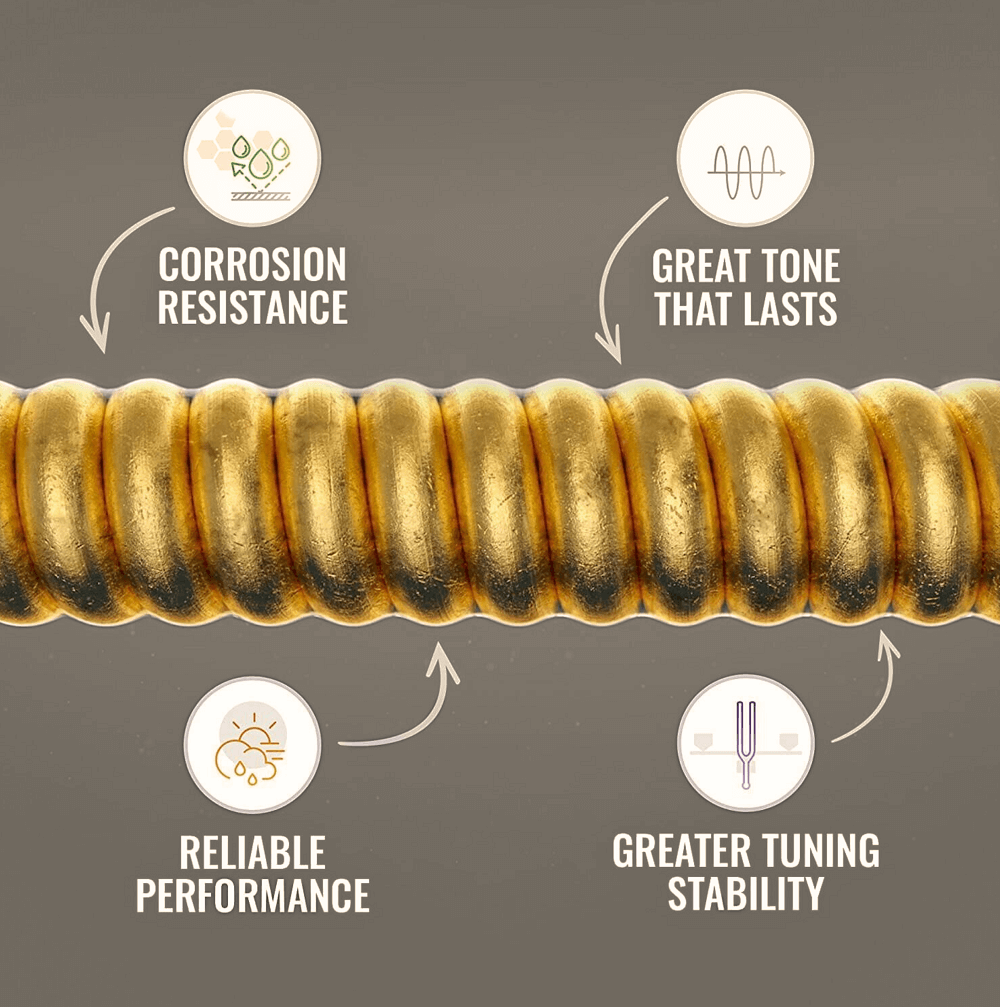
However, uncoated strings are more susceptible to corrosion and wear from sweat, oils, and dirt, which can lead to a shorter lifespan and the need for more frequent string changes.
This can be a drawback for players who don’t clean their strings regularly or those who have particularly acidic sweat.
Additionally, uncoated strings may generate more finger noise and feel less smooth under the fingertips.
Here are some key differences and considerations to keep in mind when deciding between coated and uncoated strings:
– Tone
Coated strings tend to produce a slightly brighter and warmer tone compared to uncoated strings.
This is because the coating dampens some of the higher frequencies, resulting in a smoother sound.
On the other hand, uncoated strings tend to have a more raw, metallic tone with a sharper attack.
The right choice for you will depend on the sound you prefer and the style of music you play.
– Longevity
Coated strings generally last longer than uncoated strings, and this has been proven over time.
The coating protects the string from corrosion and wear caused by sweat, oils, and dirt, and as a result, coated strings maintain their tone and playability for a longer period.
This can be especially helpful for beginner guitarists who may not be as diligent about cleaning their strings regularly.
– Playability
Coated strings often feel smoother to the touch, making them more comfortable to play, especially during long practice sessions.
The coating can also reduce finger noise and make it easier to slide between frets.
However, some players find the slickness of coated strings to be less grippy, which can affect their playing style.
– Price
Coated strings are generally more expensive than uncoated strings, and this is since the added cost comes from the extra manufacturing steps required to apply the coating.
However, since coated strings last longer, you may find that the price difference evens out over time.
– Environmental impact
The coating on coated strings will eventually wear off, potentially releasing microplastics into the environment.
If you’re environmentally conscious, this may be a factor to consider when choosing between coated and uncoated strings.
You may find that coated strings offer a more forgiving playing experience and last longer, making them a more cost-effective option.
But don’t be afraid to give uncoated strings a try if you’re looking for a more raw and authentic tone.
What’s the average lifespan of guitar strings?
The average lifespan of guitar strings can vary greatly depending on factors such as string material, playing frequency, playing style, and maintenance habits.
However, as a general guideline, most guitarists tend to change their strings every 1 to 3 months.
This can translate to approximately 30 to 100 hours of playing time for uncoated strings.
Coated strings, which offer more durability, can last twice as long or even longer, depending on the brand and quality of the coating.
Remember, the lifespan of your guitar strings can be significantly influenced by how well you maintain and care for them.
Keeping your strings clean by wiping them down after each playing session and washing your hands before playing can help prolong their life.
Additionally, storing your guitar in a stable environment with consistent temperature and humidity levels can also contribute to the longevity of your strings.
Do light guitar strings break more easily?
Light guitar strings tend to break more frequently than heavier guitar strings, due to a variety of factors.
Firstly, lighter strings have less mass and tension, making them more prone to damage and breakage when subjected to aggressive strumming or plucking.
Since they have less material to absorb the energy from string vibration, they are more susceptible to wear and tear.
Moreover, the construction and design of your guitar, specifically the bridge and nut, can influence the longevity of your strings.
If the bridge or nut has rough or sharp edges, it may cause more friction and wear on the strings, leading to quicker breakage.
It’s crucial to make sure your guitar is well-maintained and any rough edges are smoothed out to preserve the life of your strings.
Playing style is another significant factor in string breakage.
If you tend to strum or pick the strings with a lot of force or use techniques such as bending, this could increase the likelihood of breaking your strings, particularly lighter ones.
Adjusting your playing style and using a softer touch can help preserve your strings and reduce the occurrence of breakage.
Should you change all guitar strings or just the broken/bad ones?
The common agreement among guitarists is that it is best to replace all strings at once, even if only one or two are in poor condition.
As strings take time to fully stretch, replacing just one may result in it being out of tune with the others, adversely impacting your sound.
Replacing all strings at the same time ensures they have the same level of wear and age, which contributes to a way more consistent sound in my opinion.
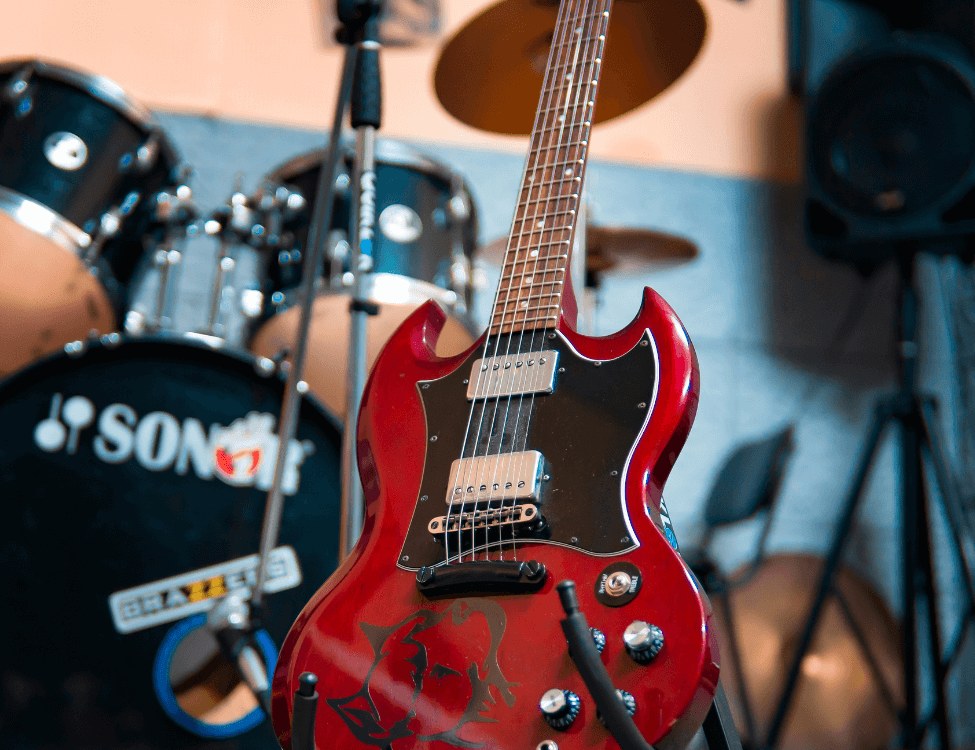
Additionally, maintaining your guitar in optimal playing condition is simply a good practice.
On the other hand, if you’re a beginner or don’t play your guitar frequently, you might not need to change all of your strings at once.
In such cases, you might be able to replace only the broken or faulty strings.
I would say this, if you’re a serious player or play your guitar often, it’s recommended to change all your strings at once.
In love with guitars, and gear; expert in all things music! Been writing about guitars for about 5 years and counting. Born in the ’90s. Alma Mater: University of Havana. Always curious, trying to understand the world. #TeamFender

